#the apothecary diaries analysis
Explore tagged Tumblr posts
Text
Episode 7 realization: Jinshi gets everything taken from him
I was watching episode seven of The Apothecary Diaries with my boyfriend (we're both reading the light novel but he hasn't seen the anime yet so I'm showing it to him) when he pointed out something that I hadn't thought about.
When Jinshi was a kid, all of his favourite things were taken away from him to--I guess--teach him not to get overly attached to things? Reasoning unclear to me. The ethics and even how effective that is aside, it taught Jinshi that the things he loves can and will be ripped away from him. And what should happen when a strange little apothecary becomes his newest favourite toy? She gets taken away. Of her own volution and only for a few days, mind, but Gyokuyō doesn't preface with that; she tells Jinshi that Maomao left, laughs, and then adds on that it's only for three days. I'm not villainizing Gyokuyō here. This scene is played for comedy and she doesn't know how Jinshi was raised. However, it does mean that Jinshi was smacked in the face with some of the worst possible news he could have received in that moment without the immediate comfort that it was only temporary.
I wonder if it's this moment that makes Jinshi realize that he has feelings for Maomao. The episode before, Jinshi gave Maomao his hairpin and those are implied to have some romantic connotation to them, but I don't think that's why he gave her one. I think he gave his hairpin to Maomao as a way to make up for all that she's been through; it's a way of saying that I'm here to help you if you need it and I will do my best to improve the system. But now, so soon after that, Maomao is gone; ripped out from under his nose by a faceless stranger without a word of warning. At least as a kid Jinshi could go to Gaoshun, Suiren, or (maybe) even his mom to beg for his toy back, even it was futile. Jinshi doesn't know who took Maomao and, even if he did, is aware that Maomao is her own person and can choose to leave to the place she was kidnapped and sold to if she wants. To an extent. If she just runs away from the rear palace, that is a crime and she would be punished for it. Jinshi is aware of this but whether it registered immediately is unclear and, if it did, that just adds another concern on top of his favourite toy being stolen away. And all of this together could be what triggers Jinshi to understand that Maomao means much more to him than just being an interesting toy to play with--to understand that maybe he cares for her more than just as a person he's responsible for, but as a person he loves.
I know this was a bit rambly but I found the realization very interesting and am looking forward to rewatching the show with this reading of the character in mind. ^-^
#the apothecary diaries#kusuriya no hitorigoto#jinshi#the apothecary diaries analysis#the apothecary diaries meta#the apothecary diaries spoilers#kusuriya no hitorigoto spoilers
49 notes
·
View notes
Text
Flowers are often used as a metaphor for the female characters in the Apothecary Diaries. And for the first time, we, the viewer, are given the direct comparison to which flower is meant to represent Maomao: wood sorrel (also known as “cat’s foot”).

It’s a flower that can treat poisons. A flower that is used to enhance the beauty of the courtesans by painting their nails. A flower with a name associated with cats. A flower that, in hanakotoba, represents maternal tenderness. It’s also one of the flowers that Lakan specifically associates with Fengxian, and by extension, Maomao herself.
In the first opening—aptly titled, “Be A Flower”—the wood sorrel is the only flower that gets special attention. The other flowers are shown together with other varieties, but only the wood sorrel is shown by itself, and more than once.


We see it again in the second opening, with an infant being held by a parent, while flitting between images of Lakan and Fengxian’s backstory.
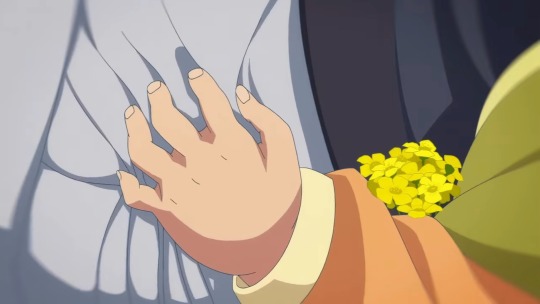
It’s such a simple flower, too. Small, unassuming, but full of diverse uses and qualities, be they medicinal or ordinary. A very fitting flower for Maomao, and what she brings to the story.
#the apothecary diaries#kusuriya no hitorigoto#maomao#fengxian#lakan#knh#mao mao#knh maomao#knh spoilers#apothecary diaries#apothecary diaries maomao#maomao apothecary diaries#neo queen serenity’s posts#tad meta#knh analysis#knh anime#kusuriya anime#tad#apothecary diaries spoilers#knh meta#knh episode 23#knh ep. 23#hana ni natte#be a flower
2K notes
·
View notes
Text
one thing i really like about the apothecary diaries is how fluidly maomao moves between high- and low-class society, between the rear palace and the pleasure district, allowing us to see the parallels in the power dynamics. in both settings, we see women trying to make the most of their relative stations with whatever tools available to them, which are often shared. much of the politics of the series centers women and the ways they try to navigate the world through seduction, marriage, beauty, fashion, manipulation, etc, because these are the things they're valued for. their appearance, their social graces, their "purity", their marriageability, their ability to bear children, and beyond - these all lend political, economic, and social leverage to themselves and their families regardless of class.
the mystery angle in particular enables the story to closely examine what tools and motives are available to women in the apothecary diaries in a way that's contextualized and humanized. it's also how the series highlights said women operating with a keen awareness of society's expectations and systems. whether that's applying deathly white powder to maintain impractical beauty standards, faking illnesses to deter certain visitors, using parlor tricks to subtly punish callous men, or wearing ostentatious outfits to hide a certain truth, each mystery we encounter reveals more about what it means to navigate the world of the apothecary diaries as a woman in addition to revealing their cleverness (or lack thereof) in doing so.
maomao is no exception to the rule, often weighing similar questions of propriety and power before she acts - although she does engage from a unique position. she's a literate woman from the lower class with special circumstances surrounding her birth, versed as an apothecary, and favored by highly ranked members of the court. this, plus her marked lack of ambition beyond medicine, gives her a lot of mobility between and (relatively) unbiased insight into both the high- and low-ranked parts of society. in turn, we readers are given a fantastic protagonist to explore what i consider a core draw of the series: seeing how maomao chooses to move through the world, highly conscious of her own social positioning as well as that of all the other women around her
#the apothecary diaries#kusuriya no hitorigoto#maomao#my jessays#anime analysis#there's extremely light hints at content beyond the anime and even manga but i tried to be careful#kusuriya analysis#idr how to tag this for myself lmao i think tad stinks as an acronym frankly#anyway i love how much women are centered in the apothecary diaries it's truly delightful and i love seeing maomao connect with other women
1K notes
·
View notes
Text
Stunted Love. Or: The Theme of MaoMao's little finger.
Maomao's little finger is a recurring motif in the Apothecary Diaries, and it receives even more emphasis in the anime's first season - it represents her belief that romantic love leads to pain and destruction. Spoilers primarily for the anime, but also the epilogue of light novel four and Chapter 15 of light novel six below.

Love In A Cage
The motif is first introduced in "The Unsettling Matter of the Spirit" - Concubine Fuyou's story. Maomao has already noted the parallels between the red light district and the Inner Palace, but here we see what happens when romantic love is introduced into the mix. On paper, Concubine Fuyou is a literal object of pity. Her personhood is being gifted to an officer who recently distinguished himself on the front lines, discarded after having failed to please the Emperor. It's telling that this is one of the first times we see Jinshi interacting with a consort where he is completely serious, without bringing his charm to bear. We never hear him say anything, but it's clear that he's communicating the Emperor's order with respect and understanding the gravity of the consequences for Fuyou.
As the events of the episode unfold, the parallels between courtesans and consorts get stronger as Maomao introduces the concept of having a contract bought out - if a man wants a courtesan enough, she is also an object to be purchased, albeit at potentially astronomical price. At first glance, it would seem like these women have absolutely no power in these scenarios - but by the end of the episode, Maomao shows us the feminine side of this transaction - how a woman can manipulate the system she is trapped by in order to get what she wants. All she has to do is lower her value - a rather counterintuitive measure that can go horribly wrong all too easily, as we see later.
And what Concubine Fuyou wants is to escape the Inner Palace to be with the man she loves - a task that she succeeds at. She has played a long, patient game in the service of freedom. Trapped in the cage of the Inner Palace herself, Maomao holds her scarred finger against the freedom of the sky and wonders what kind of medicine love would make.
Devotion
We see further flashbacks to Maomao's past through multiple episodes, but the next time the concept of love is brought up is when Fengming is confessing her role in the death of Consort Ah-Duo's baby in "Honey" (episode 11). Maomao is brought up short by Fengming's confession - she flat out says to the audience that she's never loved anyone with that depth of devotion Fengming displays toward Ah-Duo, so she doesn't know how Fengming feels. But if she doesn't have empathy to offer, she does have a rough kindness. Another person might have said that Ah-Duo deserved to know why her son died, that the knowledge might have provided closure. Maomao, however, believes that knowing the baby's cause of death would only cause more pain (it's never the crime and always about the cover-up) without providing any actual benefit.
With these two episodes framing her early character development we see that, whatever Maomao's natural inclinations are (and I will leave discussion of neuro divergency to those better qualified to discuss it), there is a certain distance between Maomao and her emotions most of the time. It is implied that this distancing from her emotions is a trauma response as the image of a woman holding a knife above her head while kneeling on a bed is shown but not explained (it is the only recurring image during the montage before the discussion about her potential execution with Jinshi).
Lakan and Fengxian
In "Lakan" (episode 18) the motif begins recurring more often as Maomao's parentage is revealed. We've caught glimpses of the sick woman in the annex before, but as the camera pans over the bed, it's clear that this is Maomao's mother (as always in anime, the hair is a dead giveaway). We've seen Maomao in this room, always curled in a fetal position, staring with blank eyes, but here we see Maomao actually caring for a woman who she describes as driving her out over and over again. The camera's focus is on Maomao's eyes as she watches her mother continuing to deteriorate - they're blank yet again, echoing her earlier line of "This is stupid. She's gone."
This is not the look of a girl who genuinely doesn't care about her mother. The image of her mother with the knife upraised is straight out of recurring nightmares that wake her gasping with terror and continue to haunt her after she's returned to work. While there is no AFFECTION involved, there are certainly very strong emotions here. Later, in the bath with Meimei, Maomao wonders if Meimei's in love - and immediately shies away from the thought, insisting that "love is an emotion I'm sure I left behind in the womb."
Interestingly, this is immediately belied as the Three Princesses (the women who took on the maternal role that her mother discarded) begin to pamper Maomao in the bath, and she relaxes into their touch, flushed with belonging and pleasure at their attention.
Confrontation
In "Blue Roses," (episode 22), everything has built to a head. By hiding Maomao back into the Rear Palace, Jinshi is acting as her shield - and Lakan responds with a power play. Both he and Jinshi are aware that Lakan knows his true identity, so Lakan provokes Jinshi with a political test. "Nothing is impossible" for a man with Jinshi's power - so providing some blue roses at a garden party in early spring should be simple, right? It's a near impossible task and Lakan knows it - even if Jinshi were to figure out how to dye the roses to be the appropriate color, they're still out of season.
Up until now, Maomao's response to Lakan has been to hide. But, with Jinshi's reputation on the line and seeing how worn out he is, Maomao has finally had enough. So she takes Lakan's challenge on and, while she's in the process of growing the hothouse roses so that Jinshi can best Lakan, she diverts unwanted attention from the Crystal Palace's handmaidens by showing Xiaolan how to do a manicure - something that draws attention to the deformed pinky on her hand and changes her perspective of the damage to the finger.
The art should be paid attention to here - we see close up shots of two other people's hands after having the manicure done - Xiaolan and Consort Lihua. In both of these shots, there's some subtle detail paid to their little fingers as well - Xiaolan's is ever so slightly crooked rather than perfectly straight, while Lihua flexes her fingers so that the pinky is extended as she looks at her hands. In the next shot, Maomao has done her nails as well - and when Jinshi draws attention to the fact that he's surprised she would do her nails (like Hongiang, Maomao usually prefers work over fashion), she looks at the finger and remarks that, even though her little finger is twisted and scarred, it looks better than it did before - an acknowledgement that the finger is not actually a hindrance, but a piece of her identity.
Healing
Giving Lakan the opportunity to finally do right by Fengxian is the most grace and forgiveness that Maomao can extend to either of her parents. Their romantic love is certainly sympathetic to an outsider, but Maomao was shaped by the consequences. Lakan's carelessness and Fengxian's willingness to break the rules of the pleasure district in order to deliberately lower her value so that she could be with the man she loved, is the guiding cautionary tale of her life.
But Maomao has also grown over the season. She is neither the terrified little girl, abandoned by mother and father alike (however unintentionally on Lakan's part) nor a teenager full of fear fueled rage at Lakan's persistence. She is Luomen's daughter and proud of that fact - she has found her family and a place in the world. It is with that more adult understanding of the world around her that she dances atop the wall of the Rear Palace, giving her parents the only thing she can, which is her blessing and best wishes for their short future, as she sends her mother off.
Sure enough, who is watching her as she takes a step toward a more mature identity but Jinshi? Other characters have provided a shield between Maomao and Lakan - Verdigris' madam, Meimei and even Luomen. But it is on Jinshi's behalf that Maomao decided to face Lakan herself. She loves her adoptive dad and granny and sisters with all the affection she never received from Fengxian, but Maomao's actions have always spoken much louder than her words - Jinshi protected her and she, in turn, chose to face her childhood bogeyman to help him.
Is it stating the obvious that Maomao tripping and Jinshi catching her is an obvious metaphor for falling in love?
As she dances on the wall, we see the two seemingly disparate sides of her identity coalesce into a whole. The moment she lets down her hair is a uniquely Japanese moment of eroticism (this is why maiko and geisha use the oshiroi that bare the nape of their necks), even as she's also deliberately reapplied her freckles.
The moment she realizes that Jinshi truly sees all of her in a uniquely emotional moment, she trips and is made terrifyingly vulnerable as she nearly goes over the edge - only to be caught safely in Jinshi's arms.
Safely back atop the wall, the little finger comes up one more time - except that this time, instead of looking at the damage inflicted and seeing the scar, Maomao looks at her pinky and shows it to Jinshi, telling him what sounds like a strangely gruesome medical fact. That a fingertip can regrow if cut off. For all the trauma that her biological parents caused her, for all that her pinky will be scarred for the rest of her life, the wound did heal. Maomao has healed - she is capable of friendship, loyalty and love that can inspire devotion - even if she rarely displays open affection.
Love Creates Fear
This motif comes back again, at the end of light novel 4 (what will be the end of Season 2, if the studio continues to stick to two light novels a season for pacing, which I expect they will). Jinshi has officially cast aside his cover as a eunuch and stepped into the political limelight as the Imperial Brother. Maomao, as a result of their adventures, has returned home, to her apothecary shop and, as she works she thinks about how everything has changed.
"Jinshi must have finally gone back to being whoever he really was. Maomao didn't know his real name: she couldn't have used it even if she did. The worlds they lived in were simply too different…Anyway, now that Jinshi was no longer a eunuch, he couldn't get away with keeping some lowborn girl around him…So it was for the best, really, that Maomao had come back to the apothecary's shop in the pleasure district."
As Maomao ruminates to herself about how she will never see Jinshi again, she retreats to what she knows best - medicine. She's got her emotions under lock and key and she's begun experimenting, working on creating a more potent painkiller. However, her pain tolerance is too high to work with her previous methods.
Or, to lay the metaphor bare, Maomao has dealt with abandonment before, but not like this. Her usual methods aren't working - so it's time to up the ante. What she does next is extremely telling.
"'Got to cut deeper if I want to be sure'. Maomao looked at her left hand, then tied some string firmly around her pinky. She stood and took a small knife from a cabinet. 'Here goes!'
Just as she was about to bring the knife down, a beautiful voice interrupted her: 'WHAT are you doing?'
Without a word, she turned to see a man in an unusual mask standing in the entryway of the shop…'Done with all your work?' Maomao asked, undoing the string around her finger and putting the knife back in the cabinet."
The thought that she and Jinshi are now living in such different worlds that they will never see each other again is painful enough that cutting her finger off in a thinly justified experiment is preferable to feeling her own emotions. What Maomao wants in this moment is a return to the emotional numbness of the past - only this time, she will do the damage herself.
But Jinshi is not Lakan and abandoning Maomao for any reason is simply not an option. Just as he caught her on the wall, Jinshi catches her again. A prince is standing in an apothecary shop on the edges of the red-light district, a place where he should not be - except for the fact that it's where Maomao is.
Connection and Communication
Finally, as a callback toward the end of light novel six, Jinshi and Maomao are beginning to reconnect after Jinshi screwed up and lost a lot of emotional ground in light novel five's epilogue, and he does the following.
"She reached out for the package, which Jinshi had put behind his back, but he planted a palm on her belly to keep her from sitting up and she couldn't reach it. She kicked her legs from sheer frustration and this time he grabbed her ankle. She was just trying to decide what he might be planning when he brushed the tip of his pinky finger along the back of her foot.
'Hrk?!' Maomao choked, squirming...The back of her foot, and her back as well, were hopelessly vulnerable to a gentle brush of the fingers.
'M-Master Jinshi...That's...not...fair!'"
While Jinshi is still the instigator in this scene, this is the the first instance of romantic and sexual contact that Maomao accepts, eventually bursting out laughing - and when he gets that laughter, Jinshi also immediately backs off, accepting that he has pushed her as far as she can go right now. But that first contact was via that tiny fingertip representing love.
His hard-learned patience is rewarded when Maomao is finally willing to speak to Jinshi about how she's feeling about his desire to marry her, first obliquely as they discuss the plot of a very familiar tragic romance, before she addresses the issue directly.
"Instead of answering, she murmured, 'I don't want to be an enemy.' Jinshi gave her a sidelong look as if to ask whose enemy she meant. 'To Empress Gyokuyou,' she said.
Would Jinshi understand what she was saying? If not, that was fine, Maomao thought. There were things even he didn't know.
'You - '
He seemed about to ask her something else when a horse whinnied outside..."
Maomao may be hesitant, she may feel very confused, but she finally gives Jinshi something to work with here - communicating to him not that she simply doesn't care about him that way, but that she has a very real, concrete fear about what a romantic relationship with him would mean, not only for them, but for everyone else around them.
That's a lot to balance on the tip of a pinky.
#kusuriya no hitorigoto#the apothecary diaries#maomao#character analysis#jinshi and maomao#jinshi x maomao#jinshi#long text post#apothecary diaries meta#jinmao
388 notes
·
View notes
Text
Eunuchs, Value, and Appearance– Brief Thoughts on Beauty and Gender in The Apothecary Diaries Manga Volume 1
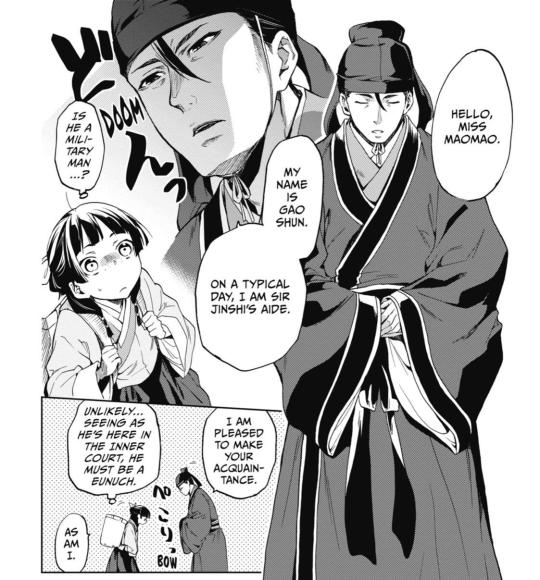
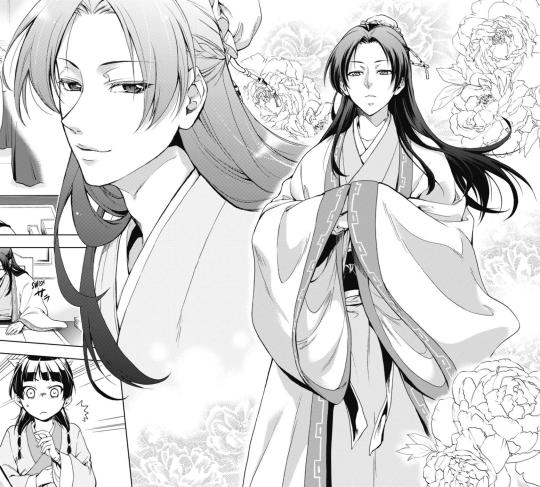
This is an offshoot of my thoughts from Ch. 4 of the manga, but it also connects greatly to Ch. 1, so a brief recap of where these thoughts sprung from:
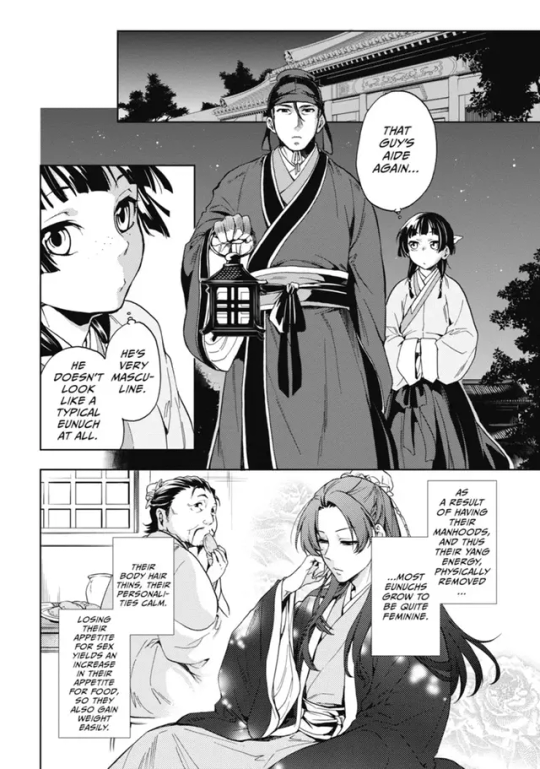
As Maomao and Gaoshun go to investigate the "ghost" dancing on the palace wall, Maomao again reflects that Gaoshun doesn't look like a typical eunuch. Her first instinct upon meeting him was the classify him as a "military man" but because he was in the rear palace, he had to be a eunuch.
Meeting again, she thinks he looks "very masculine" and not "like a typical eunuch at all." In this moment, we get another example of Maomao's understanding of and perspective on eunuchs and gender being challenged. Or do we?
A product of her time and background, Maomao has a very specific and somewhat rigid way of thinking about gender. I think that perspective ebbs and flows, but it is very much informed by the outline provided to her by the society she exists within.
Sometimes, what first appears to challenge the constraints of that outline actually works to reaffirm it.
Gaoshun appearing more masculine and like a military man is not presented in the story to challenge a bias but it is Maomao's first clue that something else is going on with Gaoshun, that there's more to the story. It is not a purposeful reflection on gender by the author but a purposeful piece of a puzzle Maomao is solving within the story.
The same thing happens later when Maomao inspects Jinshi's body and sees it is more muscular than a eunuch's would be. Without further investigation, the presentation of eunuchs that don't fit the stereotype challenges that stereotype, but the truth of the matter actually kind of relies on and reaffirms those stereotypes. Gaoshun isn't just a eunuch and wasn't always a eunuch. Jinshi isn't a eunuch at all. If they didn't seem like regular eunuchs, it's because they are not.
[And if we flash forward to how another character is addressed–Maomao observes that Ah-Duo appears more masculine than feminine, which reminds her of Jinshi. Seems like a great challenge to gender norms, but then Maomao's bias/the binary is reinforced by the fact that Ah-Duo's womb was removed. Jinshi is castrated, thus more feminine and Ah-Duo had her womb removed, thus more masculine. Or so it seems to Maomao...]
And yet, just because these moments weren't included to say something about gender, it doesn't mean that nothing on that topic is being said. And the fact remains that Jinshi isn't actually castrated/a eunuch! So he works to both reinforce Maomao's views on gender and challenge them. Though he isn't actually a eunuch, he still appears very feminine. That is, arguably in part due to the drugs/forms of suppression he uses to assume his eunuch persona and operate in the rear palace, but even without those measures, Jinshi still possesses a great "feminine" beauty. He is sort of a contradictory figure in that sense.
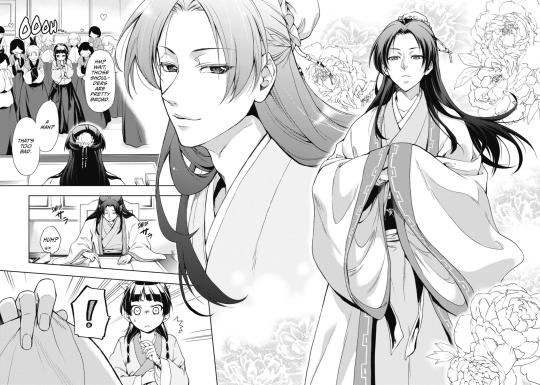
With that, I wanted to circle back to something I noted in chapter 1. I noted that Maomao is "disappointed" when she realizes Jinshi is a man and that his beauty is not possessed by a woman. I thought of this point as contributing to the conversation around gender and around beauty within the story.
I also put a pin in the idea of how Maomao values beauty and recognizes how beauty gives someone value and specifically how Maomao views beauty as it relates to Jinshi–a waste on a man, disastrously powerful on a woman, extra wasteful on a man sans frog (aka castrated).
These fuzzy reflections got some great extra translation-related context from @amiriirish (thank you for that!), specifically regarding the line "A man? That's too bad," Maomao's thought when she realizes Jinshi isn't a woman. A more accurate translation would be "A man? What a waste" or as it is written in the GX version: “'タマナシだけどな…もったいない' which roughly translates to '(He) doesn’t have balls, though. What a waste.'"
I love how @amiriirish describes Maomao's perspective in this moment as one of "a scientist, not wanting to see good genes go to waste" as within the historical context of the setting, a person's purpose is to get married and have kids/keep the family line going/pass on their genes. Jinshi being castrated means he won't be able to produce any beautiful children and so his beauty is going to waste by not being passed down.
I was pretty vague in my initial thoughts, but I meant to sort of hand-wave at these ideas (albeit in a much less articulate way) and though I do think Maomao's sexuality is another interesting conversation (and I personally favor the interpretation of her as on the asexual + bisexual spectrums), I didn't mean to highlight Maomao's attraction to Jinshi during their first meeting but rather her recognizing his general attractiveness and beauty. Love bi Maomao, but I don't actually think she was attracted to Jinshi at that moment. Like with her view of the "wastefulness" of his beauty, she is looking at him like a scientist/as more of an observer than participant.
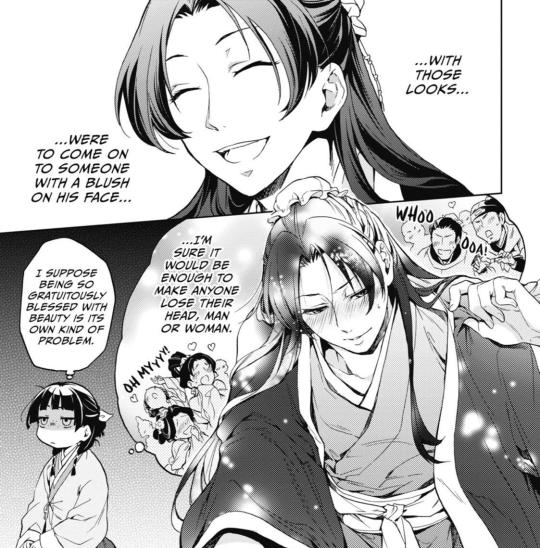
Maomao's introduction to Jinshi is the beginning of her generalizations about his beauty and how she positions herself as an outsider in those generalizations. Anyone would be attracted to him but that anyone does not refer to her. At least not yet.
Instead, I was thinking of Maomao's disappointment at Jinshi being a man rather than a woman as a reflection of her upbringing in the pleasure district and her familiarity with female beauty specifically.
We don't get a lot from Maomao about beauty or handsomeness in men. Or when we do, she seems even more removed from it. Like it isn't really worth noting. I think this is because she has learned how beauty can function as a sort of currency or tool for women.
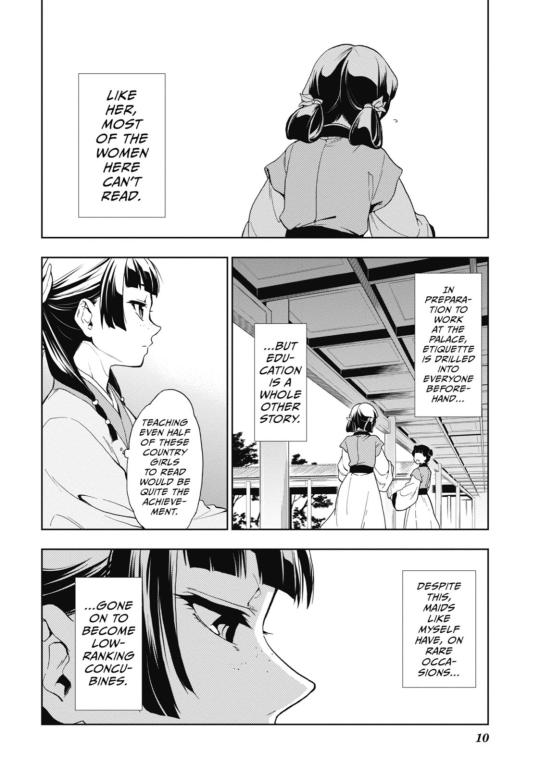
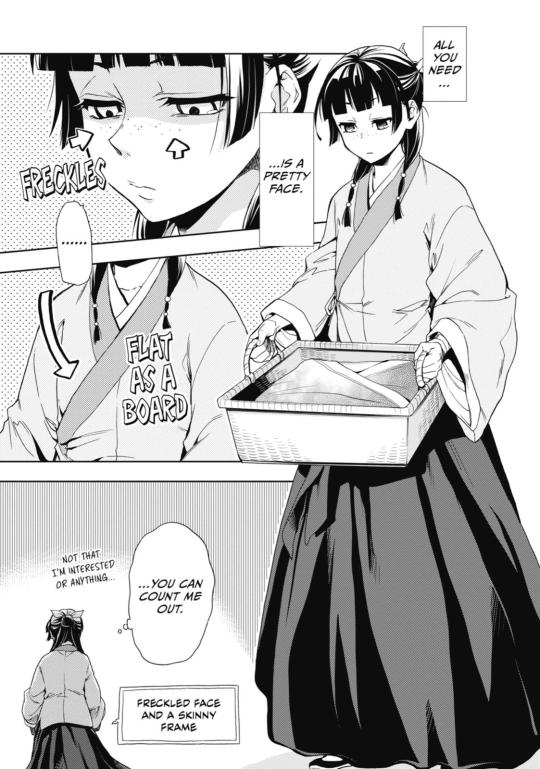
Even in the very beginning of chapter 1, Maomao reflects on how a "pretty face" (and a voluptuous body) can lead to a woman rising through the ranks.
@teaflowsthroughthesesims discussed this further in some awesome expanded thoughts:
"In the circles [Maomao] runs in beauty is power, or a means of obtaining it, mostly but not exclusively for women. In her view, it's fitting that the powerful be beautiful, and expected that it be used as a weapon or tactic of controlling others.
Beauty is also tied up in desire towards others. The desire of a customer for a courtesan is due to beauty, the desire of an emperor for a concubine naturally falls on the lovely ones -- and [Maomao's] own undesirability is tied up in her lack of beauty (i.e chicken bones vs. abalone)."
"This is why she immediately sees Jinshi's flirting as a tactic - beauty is a tool to be used. Also, she chooses ways to describe Jinshi's beauty in terms of how it would control other people - 'a nation-toppling beauty' or 'a sex appeal that would drive both men and women mad' (paraphrased)."
"Aside from her upbringing in brothels, this is also probably why it doesn't 'work' on her - she is always expecting beauty to be used as a weapon or tool."
With that being said, I think Maomao views Jinshi's beauty as a waste on a eunuch and on a man both because it means that beauty will not be genetically passed on and because it means that beauty cannot be strategically used as a tool by a woman. But after this moment of meeting, Maomao will soon see how Jinshi, despite being a eunuch and a man, can use his beauty as a tool too. Something she probably knew was a thing already (men using their looks), just something she's not as familiar with.
I think there also remains a curiosity in Maomao regarding the concept of Jinshi as a woman, which we see again later when Maomao can't resist trying out lipstick on him to try and see what he might look like if he were a woman. There's perhaps something self-indulgent in that, as well as something that brings together the world Maomao knew before and the one she is coming to know. Thinking of Maomao as a scientist, it is a little experiment, but though Maomao is practical and her view of beauty is influenced by that, I think she is more than her practicality and pragmatism too.
More thoughts in this vein will surely come once we get to Maomao's reasons for using makeup to add freckles to her face!
#Maomao#kusuriya no hitorigoto#the apothecary diaries#character analysis#beauty and power#Jinshi#maomao and jinshi#beauty and value#additional analysis#gender#analysis#gaoshun#ah duo#tad manga#knh manga#gender stereotypes
126 notes
·
View notes
Text
I'll likely make a more in depth post once I've read through all the translated light novels but
Hello Apothecary Diaries fans I am in volume 8 and would like to reassure you about the choking scene from volume 5
Spoilers under the cut!
Okay so there's a scene at the end of volume 5 (the manga is not there yet) that many have interpreted as sexual assault. For the sake of those sensitive to such topics, I'm going to give a light on spoilers version of the scene and then an in depth analysis. Personally, I do not view the scene as sexual assault, but it is very forceful and carries A LOT of very sad subtext. You'll understand what I'm getting at in the more depth part.
So, the general gist of the choking scene.
MaoMao and Jinshi are in the garden to escape a banquet. They talk for a bit about a very scary incident that occurred that day (thankfully nobody was killed) and share casual conversation. Then Jinshi brings up that they're at this banquet to find him a wife. I won't spoil the specifics, but fyi MaoMao has been wearing an accessory this whole time that loudly announces (to everyone except herself, of course) that She's The Favorite™. Despite how obvious Jinshi has been with his intentions, including holding her hand and combing his other fingers through her hair while mentioning the whole wife thing, MaoMao evades him while thinking "I'm not capable of love". So, she tries to dodge him by offering up another woman. This is what causes Jinshi to snap and choke her, as well as hold one of her arms behind her back to stop her from fighting back.
He doesn't kill her. As far as damage to her throat, the text doesn't indicate any. He then leans his weight on her. MaoMao then remembers how she was taught sex techniques against her will be the Verdigris House women & decides to use those techniques against Jinshi. She then promptly leaves and Jinshi feels like the most pathetic man in world.
The two don't interact beyond official matters until towards the end of volume 6. Jinshi brings more rare medicine in lieu of an apology. The two talk around the wife situation again and MaoMao gets tickled. It isn't until volume 7 that they have an actual conversation breakthrough.
That's my light on spoilers version of the events. Now I'll give a more in depth version, that's honestly a good chunk of my own meta-analysis around the events of volume 5.
Honestly, volume 5 is full of really interesting scenes regarding Jinshi and MaoMao. This is the first volume after Jinshi has been forced back into Imperial Brother status, yet the first thing I noticed that actually changed between JinMao is how MaoMao takes initiative with him now. As soon as she learns an insect plague might be on the horizon, she dives into unprompted research and delivers her findings to Jinshi. She's no longer working at the palace or for Jinshi, but she still takes on the extra burden. She also takes initiative to get Jinshi some extra sleep (though she misinterprets his desire to not sleep alone). And later in the novel, when they're in the paper makers' village, MaoMao acts so cute when reapplying Jinshi's burn scar makeup. I'll let screenshots talk for me.

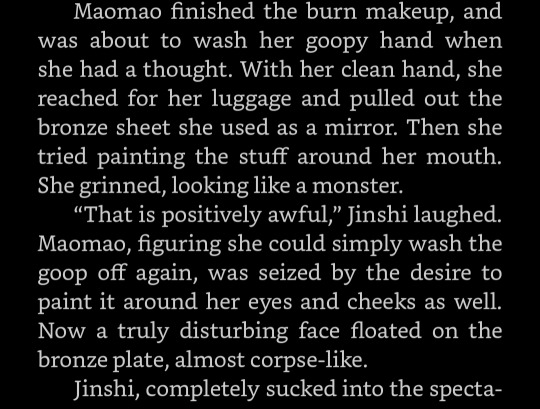

Like man. She's so cute. And I wonder, if these two didn't have to deal with social standing and imperial drama, would we get way more of them just being cute and companionable? If MaoMao wasn't an unwitting member of the Who Wants To Be An Imperial Princess race, would her feelings for Jinshi have grown without so much pushing and urgency on his end?
But I digress. I think a lot of volume 5, especially once they reach their travel destination, is MaoMao trying her best to keep her blinders on even though she is in the thick of imperial drama. She's especially desperate with regards to the blazingly obvious fact that a certain someone of very high status is in love with her. I think the end of chapter 6 does a very good job of driving home one of the major reasons why MaoMao is reluctant to trust Jinshi's feelings.

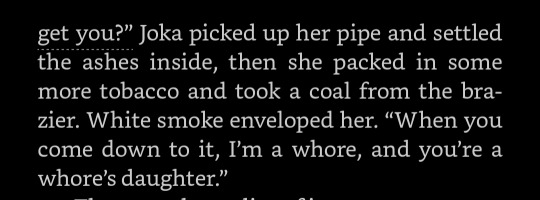
To add fuel onto this unfortunate fire is that MaoMao, as an unmarried courtesan's daughter, was attacked as an infant by her mother, sought after by fucking Lakan of all people, ignored while crying as a baby, and forcibly taught sex (to the point of tears!). She also had to cover for Luomen's own eccentricities, specifically ensuring they had enough money to feed themselves. MaoMao, to put it shortly, has been taught not to believe she can attain anything beyond her very simple life of being a lowly apothecary.
And then here's Jinshi who, as a prince, has been forced to grow up fast & have all his favorite things taken away from him. I think MaoMao is the first time he ever wanted a person. He is, for lack of a better word, obsessed with her. I think a lot of his pushiness & tendency to be clingy with her is him desperately trying to make sure he doesn't lose her. If he makes her his wife, then, well, she can't leave.
And I think the choking scene is him finally at his breaking point. At this point, he has lavished her with gifts, been very forward sexually with her twice, and given her a new hairpin that is essentially this story's version of a promise ring. It's MaoMao's repression/reluctance vs. Jinshi's desperation and so far she's winning.
But then she pushes him past his breaking point and he takes physical action against her. MaoMao responds by performing an unspecified sexual act on him.
So why don't I personally take this scene as sexual assault?
Mainly because I think the people actually guilty of sexual assault her are the Verdigris House women who forced MaoMao to learn sex.
As far as I understand it, whether MaoMao can actually say no to Jinshi is left up to interpretation. If we're talking on social status terms, she can't say no. But if you look at Jinshi's overall treatment of her, both before and after this scene, I very much think MaoMao can say no and instead chooses to defuse the situation.
Because what isn't for interpretation, however, is MaoMao's abysmal impression of what love and sex can actually be for her. So she defuses a situation by using sex, something she herself doesn't like, and doesn't allow Jinshi to reciprocate, which leaves him feeling terrible, too.
I want to be clear. I do think Jinshi is in the wrong for physically attacking MaoMao. But the sexual portion of the scene, at least to me, falls squarely on the shoulders of MaoMao's fucked up backstory.
Anyway, I think I've typed for long enough. I am using the official translations of the light novel for this analysis, so if any fans have access to alternate translations or WN only knowledge that throw my analysis in the trash bin, please let me know (fyi puedo leer el español).
#analysis#the apothecary diaries#kusuriya no hitorigoto#maomao#Jinshi#jinmao#not a headcaon#well there's a smidge of headcanon#anyway it's 8 in the morning on a Saturday and I'm going crazy over jinmao how are you doing#oh also jinshi gets sentenced to yaoi fanservice in the opening scene of volume 6 it's great
203 notes
·
View notes
Text
Kusuriya no Hitorigoto Part 1B: OP1 Hana Ni Natte

┏ · ──────── ·𖥸· ──────── · ┓
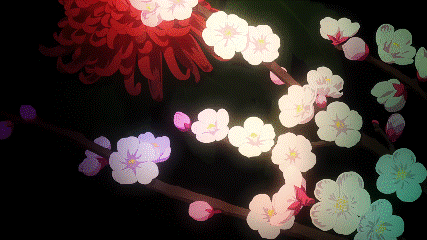
The last group of flowers featured in the first opening are theorised to represent different key characters featured in the first half of season 1. Namely the three princesses of Verdigris house, the 4 upper rank consorts as well as our protagonist Maomao.
-> 1.9) Plum Blossom
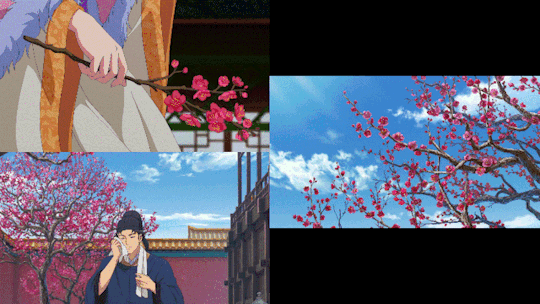

The 9th flower depicted in the first opening is the plum blossom (Prunus mume). In the anime, plum blossoms are featured in episode 12—as a part of the vase arrangement said to represent the three princesses and Maomao—and episode 21. Plum blossoms, known as ume (梅) in Japan, symbolise integrity, faithfulness, loyalty, elegance, and patience in hanakotoba. The plum blossom's stems, leaves, and seeds contain cyanide and are toxic to humans, dogs, cats and horses—especially when wilting. In Western floriography, plum blossoms represent independence, hope, resilience, perseverance and courage. They are also associated with loyalty, longevity, honouring promises, and beauty's capacity to overcome adversity. This plethora of hopeful symbolism stems from the tree's hardiness and ability to bloom even in late winter, defying the vagaries of winter weather.
-> 1.10) Chrysanthemum


The 10th set of flowers depicted in the first opening are pink chrysanthemums (Chrysanthemum × morifolium). Pink chrysanthemums appear in episode 12—as part of a vase arrangement representing the three princesses and Maomao. Chrysanthemums contain toxic substances such as pyrethrins and pyrethroids, which may harm cats if ingested. In Japan, chrysanthemums are called kiku (菊) and symbolise truth, sincerity, nobility, loftiness and true strength in hanakotoba. Pink chrysanthemums in particular symbolise sweet drams, purity and enduring love. A chrysanthemum is featured on the coat of arms of the Japanese royal family thus making the flower a symbol of nobility. In Western floriography, chrysanthemums represent integrity, sincerity, humility, happiness, and friendship. Pink chrysanthemums specifically represent the desire for happiness.
-> 1.11) Magnolia


The 11th set of flowers depicted in the first opening are white magnolias (Magnolia sp.) which are also featured in episode 12 as a part of the vase arrangement said to represent the three princesses and Maomao. While not regarded as hazardous the magnolia's flowers, leaves, twigs, and bark contain a variety of active compounds that can cause gastrointestinal discomfort, liver damage, and nervous system depression in cats. In Japan, magnolias are called Mokuren (木蓮) and represent persistence, sustainability, sublimeness and a “love for nature” in hanakotoba. In Western floriography, magnolias represent dignity, honour, nobility, perseverance and pride.
-> 1.12) Cattleya


The 12th flower depicted in the first opening is the Cattleya (Cattleya sp.). This flower is also featured in episodes 5 and 11 of the anime and is canonically associated with the Pure Consort, Ah-Duo. In Japan, these flowers are called katoreya (カトレア). In hanakotoba, they represent seduction, mature adult charm and a graceful lady. The latter is likely derived from the Cattleya’s nickname “the queen of orchids”. Cattleyas in Western floriography represent mature charm, vitality, fertility, and creativity, as well as elegance, luxury, and refinement. They also symbolise femininity, expressing beauty, grace, love, romance, passion, and strength.
-> 1.13) Lily of the Valley
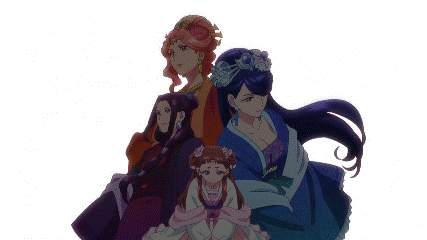

The 13th flower depicted is the lily of the valley (Convallaria majalis). This flower is also featured in episode 5 of the anime and is canonically associated with the Virtuous Consort, Lishu. Lily of Valley plants are highly toxic, containing 38 cardiac glycosides. In Japan, these flowers are called suzuran (鈴蘭)—a name derived from the bell-like shape of its flowers and its orchid-like scent. In hanakotoba, they symbolise sweetness, purity, humility and “happiness will come again”. In Western floriography, the lily of the valley represents sweetness, purity, humility, kindness, loveliness, and the "return of happiness." The flower's symbolism of the return of happiness originates from its usage as a symbol of the return of spring in northern European countries—thus representing the end of the harsh winter.
-> 1.3+1.14) Balloon Flowers


Both the 3rd and 14th flowers depicted in the first opening are Balloon flowers (Platycodon grandiflorus), often known as Chinese Bellflowers. This flower was also featured in episodes 1, 4 and 5 of the anime and is canonically associated with the Wise Consort, Lihua. These plants can be harmful to cats, resulting in symptoms such as vomiting, diarrhoea, and lethargy. In Japan, balloon flowers are called kikyo (桔梗) and symbolise eternal love, sincerity, obedience, elegance and neatness in hanakotoba. In Western floriography, balloon flowers represent endless love, honesty, obedience and the desire for a friend's return.
-> 1.15) Peony


The 15th flower depicted in the opening is a pink peony (Paeonia sp.). Peonies were also featured in episodes 1 and 5 of the anime and are canonically associated with the Precious Consort, Gyokuyou. Peonies contain a toxin known as paeonol, which can be harmful to cats, causing gastrointestinal problems, diarrhoea, vomiting and depression. In Japan, peonies are called botan (牡丹). They represent bravery, wealth, prosperity, shyness and stateliness in hanakotoba. Its association with stateliness, wealth and prosperity stems from its abundance of lush petals. In Western floriography, peonies represent bashfulness and compassion. Pink peonies particularly are associated with love, femininity and compassion.
-> 1.16) Wood Sorrel


The final flower depicted in the first opening is called Wood sorrel (Oxalis sp.). This flower appears in episodes 12, 23 and 24, and is canonically associated with our protagonist, Maomao. Although it is widely assumed that wood sorrel is toxic to humans, it is edible and has been used as a therapeutic herb for generations, and it is still employed in herbal therapy today, albeit less well-known and used than other plants. However, every component of the plant is toxic to animals if consumed due to it containing oxalic acid. In Japan, wood sorrel is known as katabami (片喰, カタバミ) and symbolises a radiant or shining heart in hanakotoba. This symbolism is not only derived from its displays of lemon-yellow blossoms but also from the fact that its leaves were used to polish Buddhist utensils and copper mirrors. Wood sorrel is frequently associated with the onset of spring and the regeneration of life. It also represents good luck, fortune, and fortitude. As a result of its distinctive leaf shape, wood sorrel has been given the moniker “Cat's paws”. In Western floriography, wood sorrel symbolises joy, love, hope, faith, luck and maternal tenderness. Wood sorrel holds a wide range of symbolic meanings, including luck, healing, protection, love, and connectedness to the natural world. In some cultures, Wood Sorrel is revered as a symbol of good fortune, bringing blessings as well as protection from evil spirits.
┗ · ──────── ·𖥸· ──────── · ┛
Part 1A│ Part 1B │Part 2
╰➤ Other anime & donghua hanakotoba posts

[A/N: Please check out part 1A and part 2 as well! Since I've only watched the anime but haven't read the manga or light novels and thus cannot comment on how everything ties into the overarching storyline or character development—I didn't go into too much detail here... Also, since there are so many flowers featured, this post would grow way too long if I did lmao.
If anyone has any ideas on what anime/anime theme song I should cover next in this series please lmk✿ Also, if you liked this post, check out my other hanakotoba analysis posts...]
#kusuriya no hitorigoto#apothecary diaries#the apothecary diaries#jinshi x maomao#maomao#jinshi apothecary diaries#maomao apothecary diaries#hana ni natte#hanakotoba#hanakotoba analysis#flower symbolism#anime flower symbolism#anime hanakotoba#anime opening symbolism#anime symbolism#anime#manga#anime analysis#floriography#jinmao#apothecary diaries anime#apothecary's soliloquy#薬屋のひとりごと#maomao x jinshi
29 notes
·
View notes
Text
Maomao and her adaptability to situations: (spoilers ahead!!!)
Kidnapped and sold to rear palace? Uses her skills to save the high consorts and their children, even when she wants to remain unseen and not involved because she believes it will cause her trouble. She even places herself in danger (the notes attached to the flowers), to assure that she put in an effort to notify these consorts that the face powder was poisoning them and their children. Her beliefs and teachings from Luomen have had such a profound impact on her and how she views the world. As much as she wants to stay in the shadows its in her nature to want to protect and inform those who might be endangering themselves.
Kidnapped a second time? Finds the positives (maybe a little gaslighting bc lets be real that must have been terrifying) : 1) keep going and maybe she will learn how Suirei made the drug to die and come back to life 2) trapped in a chamber with poisonous bugs and snakes? have a snack 3) study the books left by the former apothecary, and learn as much as possible
Left to care for Chou-u after the Shi invasion? Put him to work. She has him help her (sometimes against her will) in the apothecary, the verdagris house, on side-quests around town and in other villages. I loved the growth particularly with this situation. She is initially annoyed (internally) by this new responsibility but over time her actions towards him reflect she's grown to care for him and sympathize with him. But I also find it interesting how she recognizes his memory loss, and his paralysis on his one side, but she still treats him as any normal kid. (This is so important!) She recognizes his weaknesses but never makes him feel weak! Even when she's away from him doing her medical training at the palace(LN 7), we see her still thinking about him and his art.
Her adaptability to making friends and relying on others: (this could be its own post, which maybe one day I will tackle.) When Maomao first enters the rear palace she gives off the impression she wishes to work, earn money, and get back home in as timley of a manner as possible. But as soon as Jinshi/Gyokuyou find out how smart and applicable she truly is- we see her flourish. It's a slow transition, and I believe she always felt she was capable but when other people, besides her father and the prostitutes see her worth she begins the slow process of blossoming. Throughout the LN's we see her thinking of Jinshi, her father, Lahan, Xiolan, Shisui, Surei, En-en (and countless others) but she thinks of these people and reflects on their strengths and what makes them sparkle. Even if she insults them verbally (or internally) we as the reader are still able to grasp just how much respect she has for these people and how she notices where they flourish.
btw I'm working my way through LN 8 rn. So I'm sure I'll have more to add later but these are just some of my thoughts and admiration for maomao
34 notes
·
View notes
Text
YES YES YES, OP you get it.
I keep seeing people be like "this show is engaging because of the mysteries" or "this show is engaging because Maomao is a fun and charismatic protagonist" and like, yeah those things are fun and add a lot to the show. But what really sets this show apart is its point of view and the fact that Girl's Girl Maomao, who lives in a man's, man's, man's world, is absolutely determined to help and protect every powerless person (usually women!) that she possibly can, to the point of putting her neck on the line for women who will never know about her involvement - and she wants to do it all while being as invisible as possible.
This show's frank approach to systemic patriarchy and power structures is truly refreshing. I have had way more than enough of "protagonist girl, who is Not Like Other Girls and Doesn't Like That Girly Shit, lives in a man's world but manages to 'prove herself' so she escapes the sexist strictures of her time and is granted Privileges". For all the trappings of feminism those shows have, they completely miss the most important points in favor of showing us the old, seductive (and sexist!!!!) "ideal" of "escaping" patriarchy by performing your gender "correctly," and leaving those other women (who presumably aren't as Good as you) behind.
TAD isn't like that. In this show Maomao has a lot of privileges and also is unlike other women of her time in that she's educated and practical (and insane about poisons); but the show carefully does not paint other women in a bad light compared to Maomao. Maomao respects the courtesans she grew up with. She respects the consorts she gets to know. She respects the other laundry girls and women in waiting she gets to know. She has lovely, fulfilling friendships with other women. In fact, even when Maomao is threatening other women, you can tell that she's treating them as serious people and not infantilizing or condescending to them at all.
Maomao isn't trying to be "one of the boys." It can be argued that she literally does not care about men at all, besides seeing them as a nuisance and/or rightly regarding them as a danger. She understands that being a woman is a disadvantage to her, but she's more practical than to assume she can ever "escape" that by playing her cards right. She's not interested in "proving" anything; in fact, she goes out of her way to avoid notice. All she wants is to do what she can and stay as out of sight as possible.
And I think that's really powerful. The reality is, there's no "escaping" patriarchy. In this day and age, women as a group have more power to actually dismantle it, but only if we focus on that rather than proving ourselves to be "the good ones," as opposed to "those other (bad) women".
Which brings me to my last point. I love, love, LOVE how the characters in this show are people who might be seen as "bad" women (the courtesans aka sex workers Maomao grew up with) or "unfortunate" or pitiable women (forcible wives/babymakers to the emperor); and yet Maomao and the show treat them with utmost respect. Men, sex, bodies, and childbirth are facts of life for these women, and the show is way more concerned with how they view and interact with the world, including those aspects of their world, than it is with any man's perception of the characters themselves. Sex is a good thing when it brings new customers to the Verdigris house; it's a bad thing when Maomao has to put on freckles to avoid notice; and it's a neutral thing when Gyokyo is glad to have some "time off" when Lihua recovers. It's a terrible thing when someone gets an STD.
And yet, with all that, men aren't all there is to any woman's life (irl or in the show). The courtesans have to practice their instruments etc and they like to chitchat with Maomao about her hobbies and give her a bath like she's their real younger sister. The consorts have hobbies, and relationships with each other and their ladies and Jinshi that take up their time and mental space. These women are fleshed out characters and men are often no more than minor characters in their lives.
I'm obsessed with this show. It's so, so rare to find a show (especially an anime!) that as a feminist I can recommend with my whole chest, and I'm shocked to find such a strong feminist piece of media in a genre and even sub-genre (pseudo-historical Chinese court drama) that's so often highly problematic. Go TAD, go Maomao, I love you
Apothecary Diaries is pog as fuck bc serious political issues and dynamics from a woman's POV are rarely depicted in ANY form of media
It's always a man's world where women's issues surround him. Even if we get a female perspective once in awhile- it all comes back to how it facilitates his game in the end. She's a footnote in the overarching scheme of things. Misogyny exists. Back to the real plot.
Apothecary Diaries is strictly from a female perspective and how each class of woman has to act, what limits they have, what rights they have and don't have between each class, etc. These women have to behave a certain way under a patriarchy, which you would think makes it a man's story, but it never is. The women are THE focus of this show, their struggles are THE plot. The focus is about how the patriarch effects them.
Take the concubines for example. The show dives into how bearing a child affects their rank, how traumatizing it is to lose that child, the consequences of that, etc. We have barely seen the emperor who sired all these kids because this is not about him.
Jinshi's personal plot is secondary to Mao Mao's journey- he is mostly there to provide new cases for Mao Mao to solve and to learn more about the shortcomings of his class when taking care of citizens like Mao Mao.
Jinshi is not a bad person, but by virtue of his position in the higher classes, he cannot understand how harsh life as a poor WOMAN is specifically- he can only catch glimpses of it from what Mao Mao tells him and feel outrage but powerless in his wealth and luxury
Mao Mao is a fortunate commoner woman for what privileges someone in her class should and shouldn't have. She happened to be adopted by a knowledgeable man. She is allowed to read, write, learn, and has enough skill to be a poison tester and have a job EXTREMELY out of her class limit as an apothecary, also a job not traditionally meant for women
Mao Mao is not a "noT lIkE oThER gIrLs" protagonist, she is FOR THE GIRLIES. She only wants to help the women around her, and women are whom she has the closest relationships to. She sees a woman being harassed and can't let it stand. She sees a frail, traumatized woman dying from the recklessness of those who should be caring for her and spends day and night nursing her back to health, while also punishing the people who were so careless with her needs.
My girl has STUDIED UP on THE BODY to TEACH these upper class ladies on how to really HEAT things up in the BEDROOM
Sex depicted in Apothecary Diaries is both something women are not shamed to be enjoying, while at the same time being acknowledged as an unfortunately huge economic necessity to market themselves.
Like shit is just so real in this series???
Listen, I can go on and on about how GOATED the series and especially Mao Mao is but you get the picture
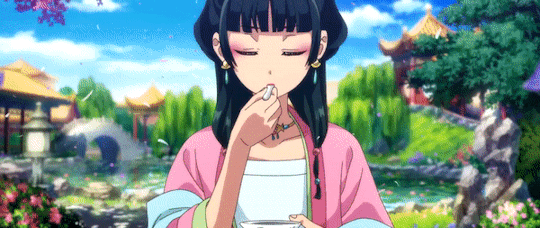
#the apothecary diaries#apothecary diaries#mao mao#Maomao#Kusuriya no Hitorigoto#feminist anime#long post#bnap rants#anime analysis
6K notes
·
View notes
Text
i get this feeling that like, reading the apothecary diaries as mainly a romance series is going to mess with your expectations of the story because (1) i think trying to map certain romance archetypes/plotlines onto it will be misleading, and (2) it really is the slowest burn i have personally ever read...
this is in large part because even though the story pivots around maomao and jinshi, so much of the story including past the manga into the light novels is about maomao's emotional growth and jinshi's imperial court politics - which is to say, not only or even primarily their romance. if anything, it's more about the journey of two people to eventually become the right partners for each other with crumbs of growing chemistry along the way. but it's not about them getting together, because so much of the story is maomao getting herself entangled in mysteries and situations that test (and overwhelm) her desire to remain emotionally distant, that teach her more about the nuances of humanity and her own heart. the mystery and political intrigue elements are still the primary driving force behind the narrative, so i feel like framing the story as a romance will make you expect romantic genre conventions that don't really map properly onto the actual series.
don't get me wrong, the slow burn romance is ABSOLUTELY a massive part of why i burned through the published english light novel volumes in 3 weeks, but i think being able to stop and appreciate how gratifying it is to see maomao grow beyond her grumpy "i don't want to get involved or get attached to anyone" disposition thanks to all the friends she makes and people she meets....... it's so lovely. and it does make her more able to respond to jinshi at that. anyway yeah. i do have qualms about stuff here and there, but i love this series damn
#a jesst#my jessays#this is very disorganized and weak it will not go into the tags until i feel more confident about what im trying to say ahaha#but idk reading some of the anime reactions has me like. dang someone selling this as a romance to u seems to be warping ur expectations?#if anything it's a bit detective conan-y where there's def romance but the mysteries and overarching plot take precedence#the apothecary diaries#kusuriya analysis#knh analysis#maomao#jinshi#jinmao#edit 3/5/24: added tags for my own organization lol it's been long enough that ppl may not find this in the tags easily anymore#anyway this was in fact me reacting to ppl watching or reading knh as if it's a romance and it's like. idk i feel like that just sets up the#wrong genre expectations and messes with one's ability to appreciate it as is but what do i know
14 notes
·
View notes
Text
Tragedy of the Jade Nightingale. Or: My thoughts on Vol. 11 of the Apothecary Diaries.
Given that this volume just came out in English a few days ago, spoilers under the cut!
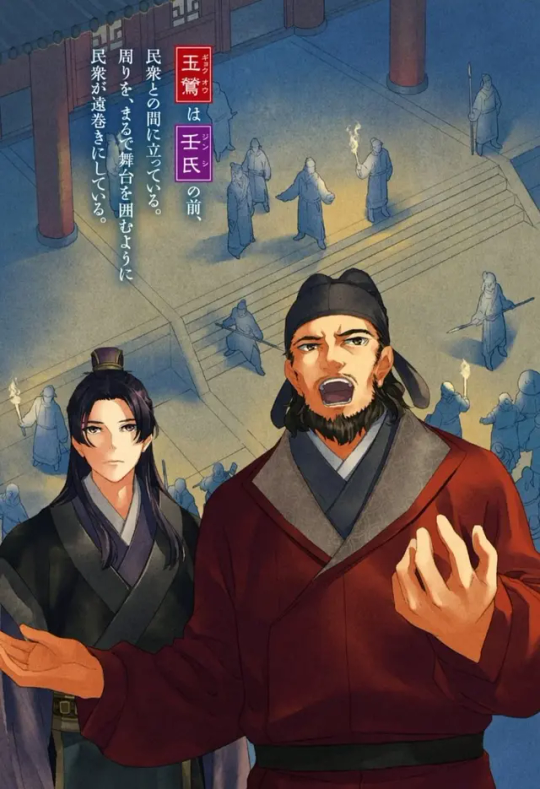
I usually think of the Apothecary Diaries volumes as pairs - usually two volumes make up an arc. If so, Volume 11 will be the first half of the arc with 12, but it also functions beautifully as a tragedy in it's own right.
** I will be only discussing information appearing officially through Vol. 11. Yes, I have read the fan translations of the web novels, but given that details can change, until it appears in official English translation, I won't yet be including it here.
The Hero
Gyoku-ou. Talk about someone who thinks he's smarter than he actually is. We knew this guy was a threat all the way back in Vol. 8, with how Gyokuyou reacted to her brother's letter and his veiled insult of sending a younger version of herself to catch either her husband's attention or the Imperial Brother's. Now we get to see him in action and he's scary - right up until he's not.
This man is charismatic as anything - he understands what makes people tick on both an individual level as well as a social level. His ability to wield a mob effectively makes him extremely dangerous, but I'm oddly put in mind of Lakan's initial impression of Fengxian. "This woman is strong, but she only knows how to fight in her own, small world."
The world Gyoku-ou inhabits is a very small, petty one. You can see it in his conspiracy theory about Jinshi's birth.
Jinshi is one of two people Gyoku-ou fails to read. When he brings Lakan and Jinshi to his puppet council to gauge support for attacking Shaoh, he thinks he's got a young malcontent in his hands, someone who wants power and is prone to the flashes of temper and insult that often drive young men. Someone who is easily manipulated. Instead, Jinshi mops the floor with him in that meeting, cutting Lakan's support out from under Gyoku-ou and making it clear that his priority is peace above war.
This doesn't take away from Gyoku-ou's political genius - this meeting teaches him that Jinshi has to be maneuvered around, rather than maneuvered directly. If the Imperial Brother doesn't want to play his part, then too bad. Gyoku-ou will see to it that Jinshi is hedged in all directions except where he wants him to go - which is to war. And even then, he's got a fight on his hands as Jinshi fully takes advantage of Empress Gyokuyou's information to undercut Gyoku-ou's support within his own family.
It's a mark of Jinshi's political skill that Gyoku-ou's move in that family council is to flirt with treason. If he can't maneuver the Imperial family through Jinshi, then he shifts tactics to turn Jinshi (and the rest of the Imperial Family) into the villain of his piece - a prince born and raised into utter depravity.
Let's just sit with what Gyoku-ou suggests to the rest of his siblings (minus the Empress) in that meeting. He implies that the Emperor impregnated his own mother in order to produce an heir. A son that he loves so dearly (and unnaturally) that he would willingly look the other way while Jinshi murders his other children in order to make sure that his brother-son-lover succeeds the throne.
This is a brilliant examination of how the bare facts of the situation can be construed by people with very different motivations to fit whatever worldview is most convenient for them. I'm a fan of the palace politics in this series because they feel very real.
Gyoku-ou doesn't lie once. But boy does he create a narrative that suits his purposes and dares anyone (namely Rikuson) to tell Jinshi. He is escalating the situation and he's doing it fast, while also challenging the legitimacy of the Imperial Family. A fact which, if it does get back to Jinshi (or the Emperor), could get the entire new You Clan wiped out just as fast as the Yi Clan was. This scene functions as a microcosm of Gyoku-ou's two fundamental character flaws; his short term thinking and his utter self-absorption.
Becoming The Wind
Since Rikuson was introduced in Vol. 5, he's been a mirror for Jinshi. He's a "pretty boy," calm under pressure, fundamentally kind and decent to other people while also being extremely competent at his job. Unlike Jinshi, he's also a bit older and more mature. He also clearly admires Maomao and sees the qualities that make her exceptional, despite her various masks.
As it turns out, Rikuson mirrors Jinshi in another important sense too - he also has a secret identity. The Yi Clan were the de facto royalty of the Western Capital and Rikuson is one of the direct survivors of the clan. He was never in the line of succession given the Yi Clan's matrilineal structure. But they were quick enough to save some of the children, namely Rikuson and Empress Gyokuyou's three ladies in waiting, Haku'u, Koku'u and Seki'u.
Rikuson, who was Gyoku-ou's excuse to trick His Former Majesty into giving him the authorization to destroy the Yi Clan. Rather than truly being an bastard Imperial prince, he's a young pawn in Gyoku-ou's hands to whip up an armed mob to hunt Rikuson down - and his mother and sister give their lives to ensure his survival - not for vengeance, but so that the Yi Clan's mission of protecting the west will live on even if the named clan itself dies. So, like Jinshi, he is dedicated to the welfare of the people above all else.
The trouble with relying on an unruly mob is that it's sloppy. Gyoku-ou left multiple survivors and they have absolutely no love for him. He's left weapons at his back.
Rikuson is the other person Gyoku-ou utterly fails to read. He spends well over a year back in his homeland, working for Gyoku-ou as an aide ostensibly from the central region, patiently waiting for an opening - even as Gyoku-ou, who knows that Rikuson has to be assigned to the west with some kind of ulterior motive, is so blind that he thinks he must be a secret member of the La Clan, rather than the Yi boy he tried to kill seventeen years earlier.
Rikuson represents the culmination Gyoku-ou's short term thinking in that he doesn't bother to think about the threat of any surviving Yi clan might pose to him.
He will not insult his mother's memory, or his sister's. But if his mission of protecting the west coincides with vengeance for his family? Sure enough, Gyoku-ou's insistence on going to war (and dragging the Imperial family's legitimacy into his motivations) gives Rikuson his opening; especially because he isn't a vigilante.
He is acting under orders.
The New You
Rikuson's point about Gyoku-ou's life being a tragedy hits home when you consider Gyokuyou's thoughts of how she knows her father loves her - but would also abandon her in a heartbeat if she is no longer valuable to him. Unlike her older brother, she has a very clear-eyed view of how their father operates and focuses on making sure that her value never drops in his eyes.
Gyoku-ou's value to Gyoku'en plummeted the day he destroyed the Yi Clan - Gyoku'en's family. He was given a second chance to show that he could still perform the single function of the men of the Yi Clan - to protect the west. When he endangered it instead, Gyoku'en sent the weapon he'd spent seventeen years preparing (Rikuson) with an execution order.
By first destroying the Yi Clan and then following it up with a proposed invasion of Shaoh, Gyoku-ou proved to Gyoku'en that he was no son of his. Given how desperate he was to be his father's son, this whole book is a tragedy in the classic sense. The Jade Nightingale was so desperate to reinvent himself as a Jade Eagle that he destroyed himself in pursuit of the one thing he never lost - his father's love. But, to be his father's heir, what he needed was Gyoku'en's trust and respect, not his love.
And he killed that seventeen years ago along with the Yi Clan.
Ironically, the foreign born girl that he despised and attempted to undermine at every opportunity, emerges as their father's true heir and mother of the nation, with the rest of the surviving Yi clan as part of her loyal retinue.
In her triumph, the Yi Clan is reborn as the You Clan as Gyoku'en, a Yi man, is given a clan name on the strength of Gyokuyou's role as Empress. So much of their history has been lost, down to the matrilineal succession and family records, but their mission lives on through the Yi men who will continue to protect the west, no matter the personal cost to themselves. There is no room for self-absorption here, therefore Gyoku-ou has no place in their new clan.
Also, a parallel to pay attention to is how the destruction of the Yi Clan and the Shi Clan are mirroring each other with the children being saved. The Yi Clan is reborn with a new name, which leads one to wonder what the consequences of saving those Shi children will be long term.
A Dagger In The Dark
Gyoku-ou sucks up a lot of air in Vol. 11 because he is driving the action - Jinshi, Maomao and their party are all stuck reacting to him, except for one character; Chue.
We see Chue attach herself to Maomao starting with the ship and it's not difficult to guess that just as Lihaku is serving as a discreet bodyguard for Maomao on Jinshi's orders, Chue is also there as protection. Chue doesn't try to conceal that she is clearly trained in espionage either.
Rikuson's proposal to Maomao is not a serious bid for her hand, but nor is it a joke - it's a message to Chue that Jinshi needs to tighten security around Maomao. As he puts it, he knows the "hyper protective" elements around her will close ranks. Because he's foreseen a strategy that may not have yet occurred to Gyoku-ou (who tends not to pay attention to the bit parts of the play), but if it does would almost certainly push the country into war.
Maomao is the lever that could move both Lakan and Jinshi.
All he has to do is kill her and make it look like a foreign attack. Lakan's instinctive ability to read a situation and Jinshi's formidable investigative skills would likely be dulled in the face of their rage and grief. Especially since they are technically Gyoku-ou's guests and don't have freedom of movement to push the issue.
Rikuson seizes his opportunity before Gyoku-ou can continue to escalate, but he realizes quickly that Chue arranged the stage and was there as both spy and backup assassin. (I think it's safe to say that Gyoku-ou's conspiracy theory AND that Yi family ledger will be reported, given that we know there were ladies-in-waiting at the meeting and that's how Chue was disguised - and she didn't actually promise to dispose of it).
Gyoku-ou doesn't bother to think that while the Emperor may be far away and the Imperial Brother is a manageable threat, that the people surrounding Jinshi may not be bound by his strictures. Hence, Chue was on standby. No matter what, Gyoku-ou was never going to make it to that ritual. He was never smart enough to realize that his crossing the line would be never be forgiven.
While Jinshi would order an execution if necessary (and has in the past), he would never order an assassination. Therefore, it's evident that Chue reports to someone else. Who that someone is, we don't know, but there's only one person further up the Imperial tree than Jinshi, so it would be reasonable for Rikuson to assume that the Emperor has placed additional protection around not just Jinshi, but Maomao.
Exclusive: Baby Swap!
Jinshi's birth is not a secret to the audience and while Maomao doesn't have confirmation, she's pretty certain of her suspicion. This volume made it patently obvious that there are others out there who are perfectly capable of putting the pieces together, even if the details are twisted.
Let's return to Gyoku-ou's conspiracy theory.
He's put together all the correct pieces. The Emperor's attitude toward Jinshi makes no sense in a traditional palace setting - a much younger, handsome, charismatic and competent brother? That's a threat to the Emperor and his direct line. But Jinshi is never treated that way - instead he's indulged on many fronts.
He's allowed to duck most of his official duties as Ka Zuigetsu (except for a few he can't, where he appears masked).
He's allowed to pretend to be a eunuch for six years and run the Rear Palace.
When he finally reveals himself to the court to put down the Shi Rebellion, he's described as "hale" and "just as proficient in the military arts as the administrative." (More proof that Jinshi is NOT the best judge of his own abilities). He emerges fully formed into court politics - a perfectly trained Crown Prince - only to have a newborn given the title instead.
Gyoku-ou deliberately put the worst possible spin on these facts. I suspect the rest of the You siblings are going to keep their mouths shut about Gyoku-ou's ugly theory, but if he could think of it, if Maomao could think of it with just seeing Jinshi standing next to Lady Ah-Duo, then so can others.
Maomao can be mad about Jinshi branding himself all she wants, but it's currently looking like an absolutely BRILLIANT move on Jinshi's part. Whatever doubts Gyoku-ou managed to plant about Jinshi and the Emperor's motives with the rest of the You clan siblings, Empress Gyokuyou is not likely to entertain it.
Also, it got the Emperor to essentially "banish" Jinshi to the edges of the Empire shortly after his new Crown Prince was born, which makes it look to other members of the court like the Emperor is taking steps to rein in his younger brother and balances the factions that have to be forming back in the capital.
This is not a secret that can be kept forever. No matter how careful Ah-Duo and Anshi were, the information is starting to leak out around the edges, as we see that the Empress' ladies in waiting that were dismissed clearly had eyes and ears - and in at least one case, a loose tongue.
The next arc is being seeded and Jinshi is inching closer and closer to that throne. He ran the Rear Palace for years (essentially managing the nation in microcosm) and as of the end of Vol. 11, he's now stepping up to govern a province and gain actual ruling experience while also having suppressed a war.
I've said before that Jinshi ascending the throne is the bad ending - if there is a single person who is more trapped by the palace than the prince, it's the emperor. We'll see what happens!
#the apothecary diaries#kusuriya no hitorigoto#jinshi#maomao#jinshi and maomao#apothecary diaries meta#long text post#no really#very long text post#jinmao#jinshi x maomao#apothecary diaries#gaoshun#taomei#chue#basen#bayrou#suiren#character analysis#kusuriya light novel#volume 11#gyoku-ou#rikuson#gyokuen#lady gyokuyou
204 notes
·
View notes
Text
Thoughts from reading The Apothecary Diaries Manga Ch. 3
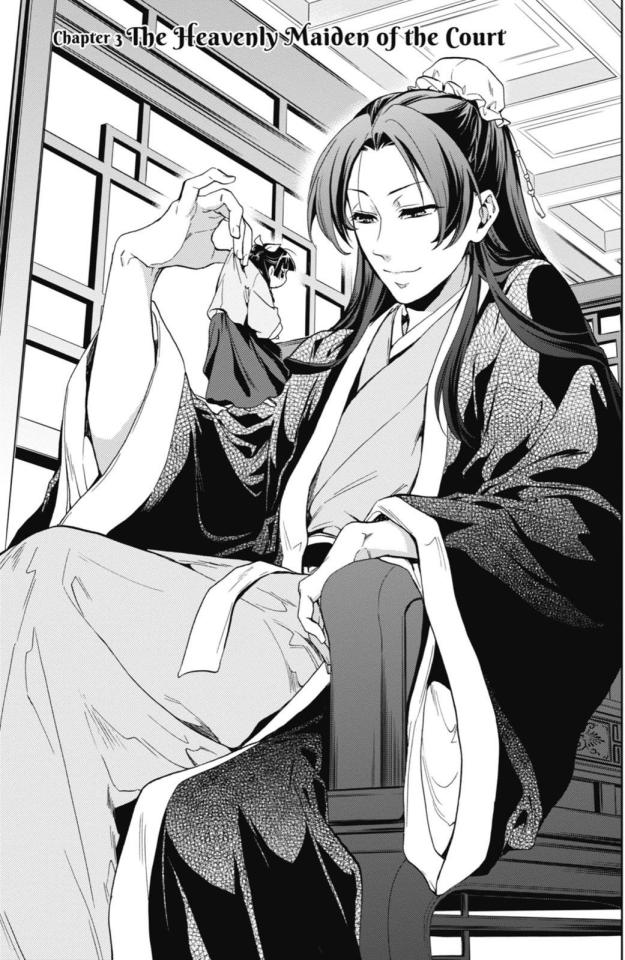
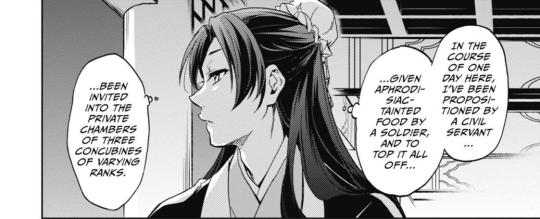
An expansion on an idea presented last chapter–how Jinshi's appearance affects how others treat him and the potential seriousness of it. Don't want to take it too far, but could it be said that people treat him how women are often treated in real life? With cat-calling and such. Only there's a difference in the power dynamics at play as Jinshi is in a role of authority.
Here we are also getting more insight into Jinshi's internal life and thoughts, which present a notable contrast to how Maomao views him and the persona she has so far observed. He's not all charming smiles and sparkles, we see him contemplative and expressing a range of emotions.
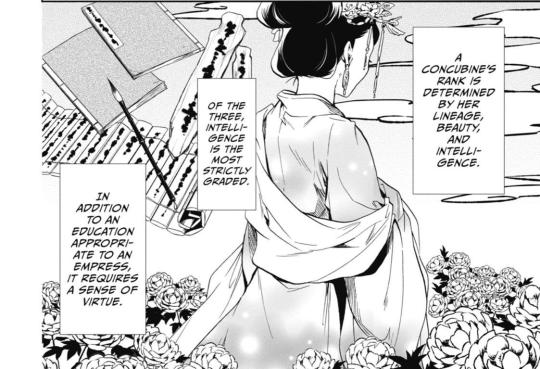
As of now, though her intelligence is notable, you wouldn't say Maomao could check these boxes, but lineage + beauty + intelligence are qualifications I think we should keep in mind in relation to her character. Maomao low key has some princess raised as a peasant vibes going on. Maomao and "a sense of virtue" have a less clearcut relationship, but it will be a topic of conversation in the future.
I think it's easy to imagine that in a more typical story, Maomao might have a more Cinderella-like arc, a peasant gaining the attention/favor of the Emperor through beauty and kindness and I am once again reminded of how Maomao is valued first and foremost for her intelligence. She will be found to be beautiful, but her beauty did not gain her Jinshi's attention or her position as a lady-in-waiting.
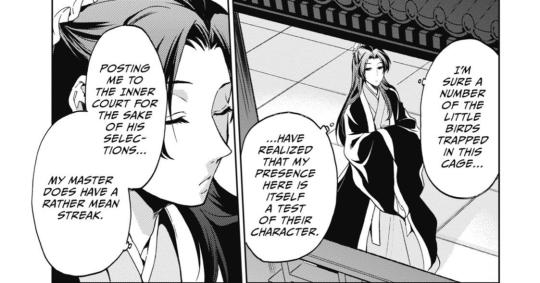
Both Maomao and Jinshi think of the rear palace as a cage. I wonder if he considers it a cage for himself as well considering what he must do to occupy space there? Or is it simply the opposite–a path to freedom? Perhaps both?
Jinshi also recognizes the role he is to play, but that does not mean he supports all the actions he must take. Everything is not always what it seems. Like Maomao, Jinshi is pragmatic about his appearance and recognizes the value/power in his beauty, but he also seems to resent it to some degree and view it as a burden. Pragmatic but resigned.
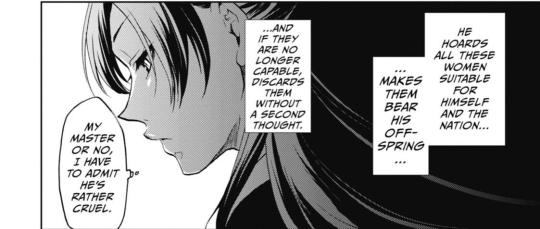
Jinshi's pov on the entire concubine system is quite interesting. He seems to disapprove of how things are done (and how the consorts/women are treated?) Surely this clashes with his desire for the Emperor to secure an heir?
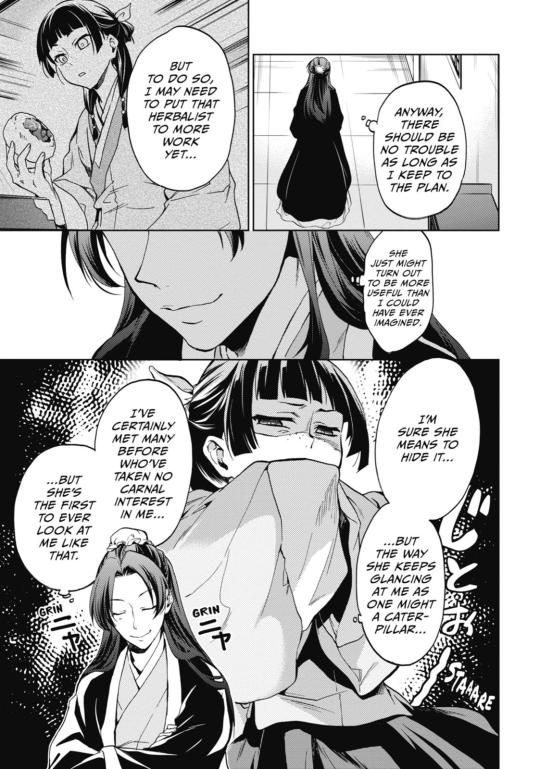
Is "the plan" the one regarding the aphrodisiac (and the mid-ranking concubine/military officer)? Or his wider plan regarding working in the rear palace?
I'm wondering about what exactly produces Jinshi's feelings of...let's call it "glee"? in regards to "using" Maomao and how useful she will prove to be. Is it that she entertains him? Excites what feels like a dull and monotonous life? Is it that he enjoys exercising power in this way? I feel it's more the former, especially since he next goes on to describe how she treats him differently than anyone else he has ever encountered. She is novel. And Jinshi, as someone used to people being taken with his beauty, enjoys how her reaction to him goes beyond being unaffected by his beauty to the point of being repelled by it.
It's interesting that Maomao can seem rather monotone and subdued (except when she's not–she is extremely expressive when it comes to what she is passionate about, like poison), but her face also often acts as a give away. (Is that just a Jinshi related thing?) I mentioned this in the previous chapter and how she skirts the line in terms of respectfulness in how her actions and expressions (and even tone) clash, but maybe she isn't really so successful in skirting the line if her expression is so obvious.
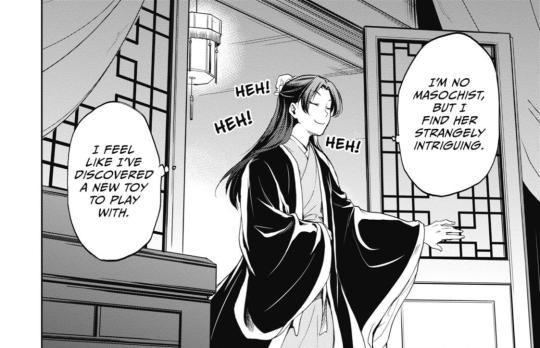
I find it interesting how the manga opts to adapt the idea of Maomao as a "new toy" for Jinshi–he is the one to think it and make that connection. Also lol at it having him explicitly state he's "not a masochist" because hmm there's an argument to be made that both he and Maomao derive pleasure from pain.
Maomao as intriguing to Jinshi feels important. I said that he values her knowledge and skills, and I suppose that + how she treats him differently than others do (+ him eventually seeing her as quite beautiful) forms the basis of his attraction to her. But her being intriguing also factors into that and reminds me of all the intrigue and mysteries Maomao (and Jinshi) get involved in. She herself is like a mystery to be solved (as is he to her as the story goes on!)
Maomao as a toy also speaks to how Jinshi uses her. Yes, she entertains him, but "toy" also connotes a power dynamic (and so part of the enjoyment does come from having power over her?) Maomao is of course later referred to as a cat, not to mention her actual name, and Maomao as Jinshi's pet seems like an apt way to describe their initial dynamic.
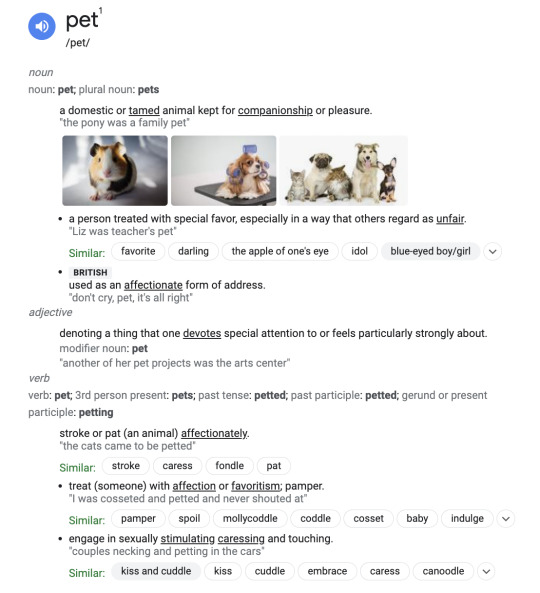
(oh no she fell down a (pet) rabbit hole) BUT I really think there is something to be said for considering Maomao and Jinshi through "pet" and all its various meanings. Only thing is Maomao is not tamed or domesticated XD (but maybe she'll trend in that direction as time goes on aka adapt to Jinshi's lifestyle and status?)
For now, Jinshi is the master and holds the power in a traditional sense, but he will also quickly develop affection and favoritism for Maomao (and wants her companionship!) + despite how the dynamic should work, Maomao will hold power over him in turn (as with actual cats, the question is who is really the master and I think the answer is both)
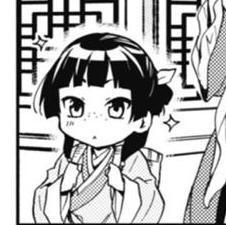
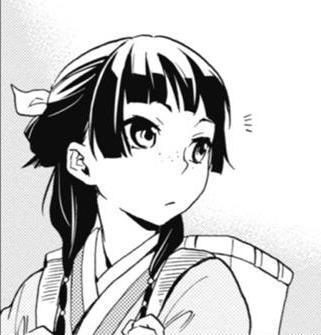
Cutie Maomao appreciation segue
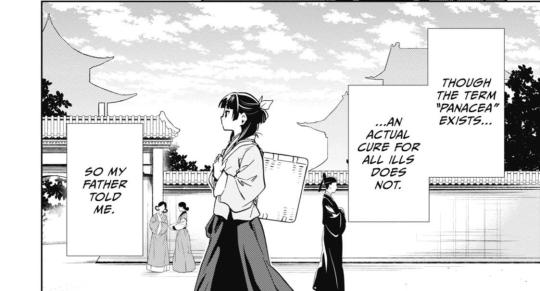
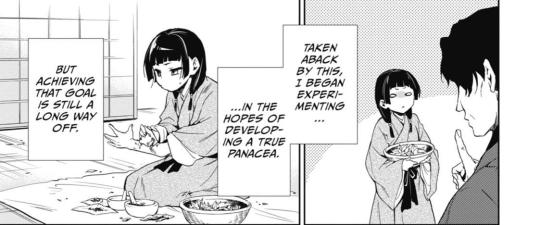
The panacea is presented here as a bit of a segue itself and to show Maomao's enthusiasm + passion + dedication to medicine and experimentation, but it always feels like a weighted thing to drop, like it will be important later, at least symbolically/metaphorically. Perhaps it also works as the perfect intersection of Maomao's care for others + thirst for knowledge/curiosity.
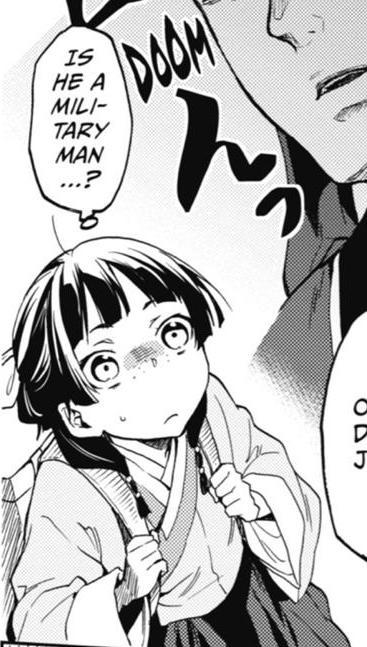
Mini Maomao! A reminder of how petite she is and how that works along with her status (as a visual representation of it in contrast with characters higher up who tower over her). Another way she appears unassuming and is underestimated.
(also–yay Gaoshun is here!!)

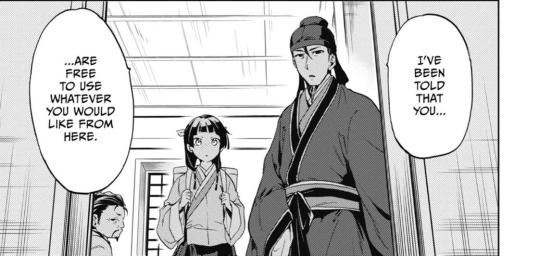
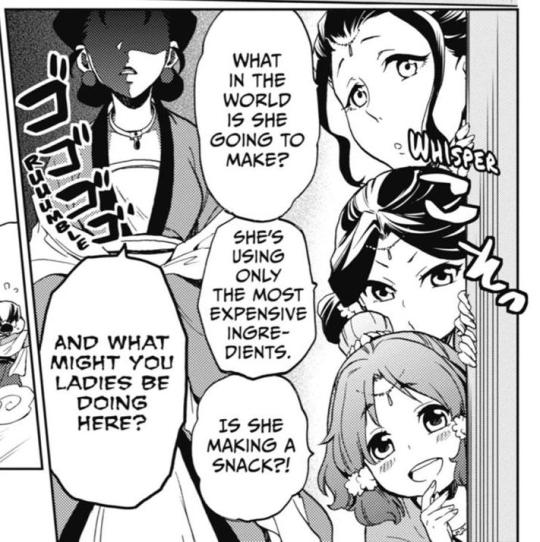
In terms of Jinshi using Maomao vs Maomao using Jinshi– Jinshi's status enables Maomao access and freedom (that she wouldn't normally be afforded in her position and situation) through her connection to him. She is able to do work she enjoys and indulge her curiosities because of him.
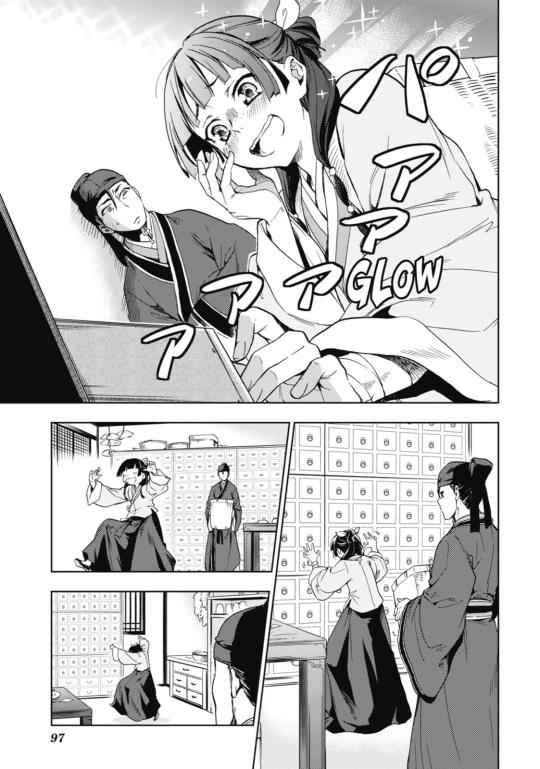
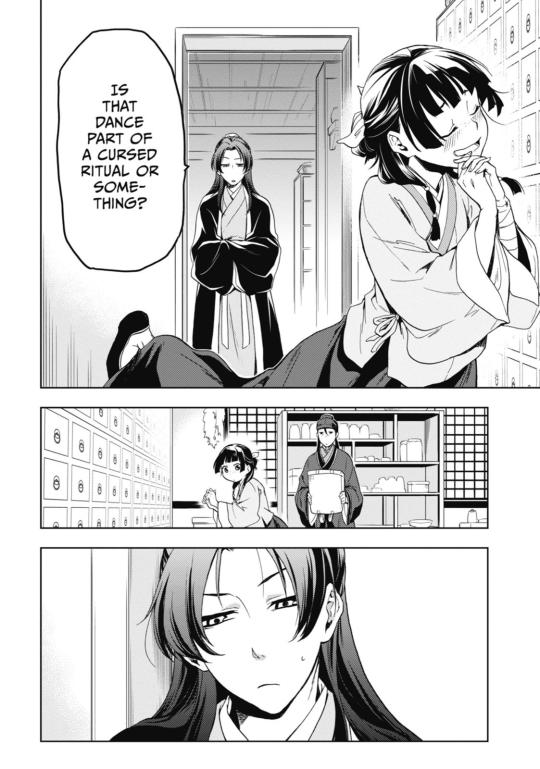
Circling back to what I said earlier about how Maomao can seem subdued but is extremely expressive when it comes to what she is passionate about. And it actually goes beyond her facial expressions, her whole body is invigorated and taken over XD
Her blushing expression and body position at the top of that second page almost resembles a girl in love lol
It is an interesting adaptational choice to make Jinshi's expression kind of an unamused frown here–I wonder what to make of it. (We get it described as "He watched her with a mixture of curiosity and sheer bewilderment" in the light novel). Especially as it presents Maomao in a different light than he has seen her in so far.
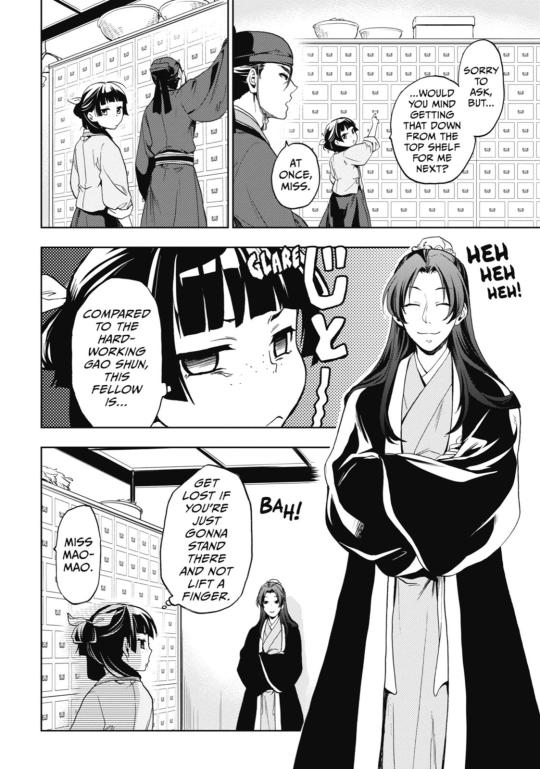
It feels like Maomao is almost actively seeking reasons to criticize and dislike Jinshi (to justify the instinctual bad vibes she gets? And going off the fake-ness she picks up on. This can also demonstrate a general dislike of people in high positions and the behavior their status affords them) but also this moment illustrates her appreciation for hard work and competence. Not that Jinshi is doing anything admirable here, it is just that Maomao seems determined to (understandably) see the worst in him/leans into bad faith interpretations of his actions.
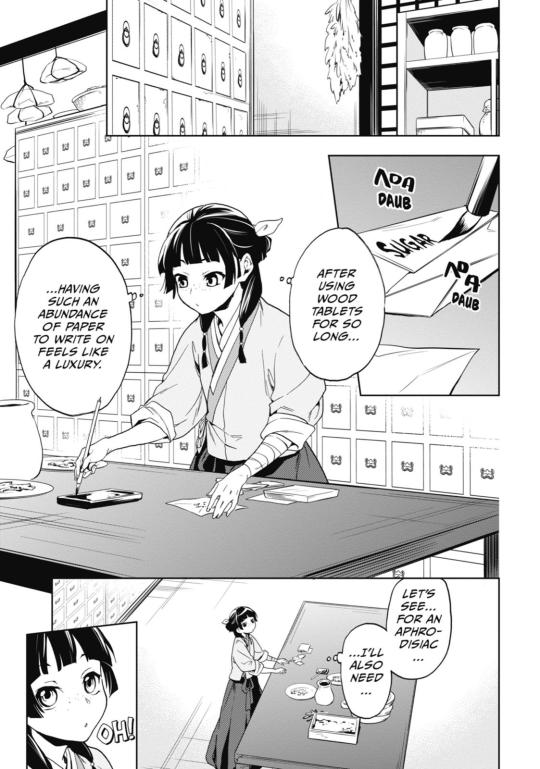
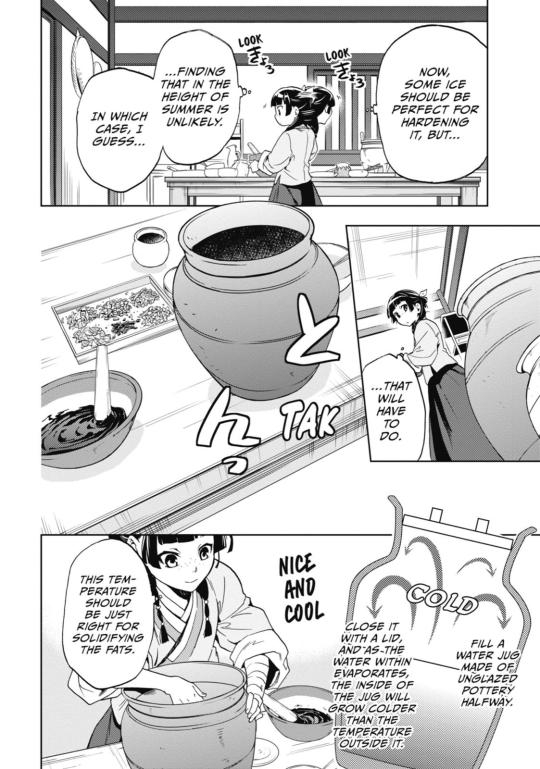
Paper and ice–I call this the collection of planting seeds for future storylines and topics. I love how we're given information that will be relevant later in a way that feels natural and factors into the world-building.
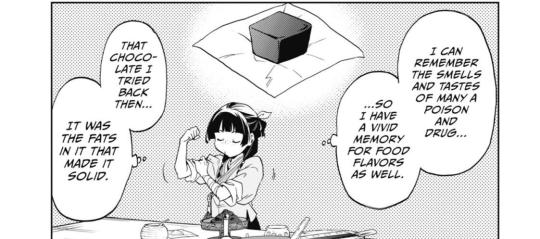
Things to add to Maomao's list of skills XD
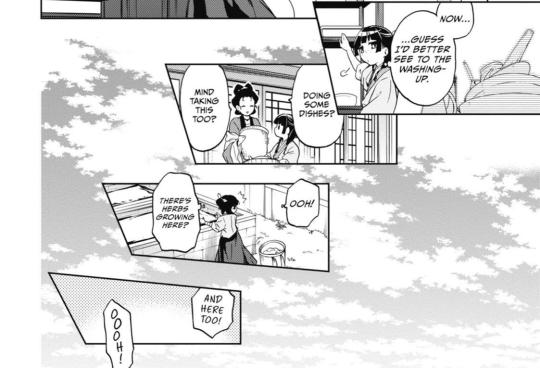
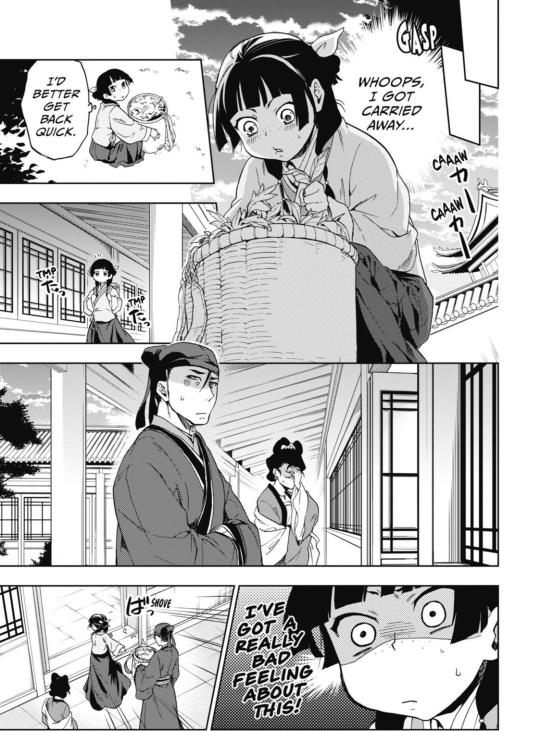
Okay Miss Maomao getting distracted on the job! More of her getting invigorated by her passions and how they can take over her mind and focus. But also amusing considering her criticisms of Jinshi "having too much free time" (yes, she still washed the dishes and did work, but her attention was diverted and she lost track of time)
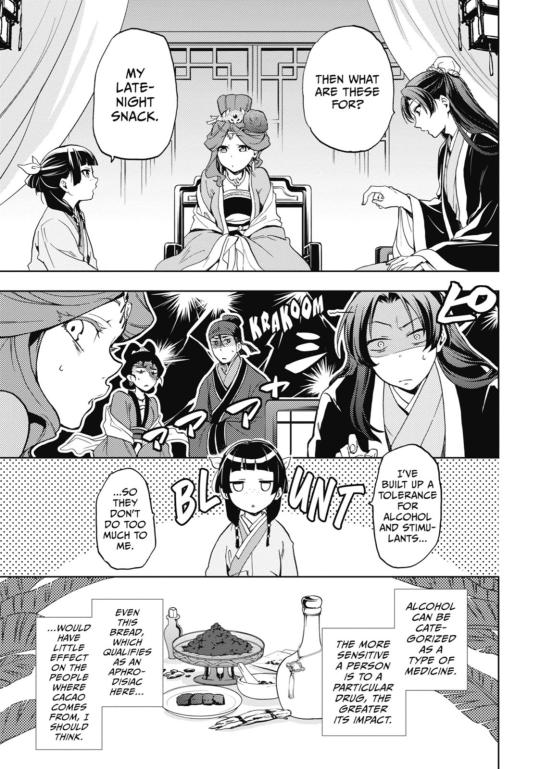
More of Maomao's skill set and add alcohol to the list of seeds for the future (and lol @ everyone's reactions to her late night snack plans "what weird shit is this girl into?")
"Alcohol can be categorized as a type of medicine. The more sensitive a person is to a particular drug, the greater the impact." Not just a seed but add it to the pile of potential poison/medicine symbolism
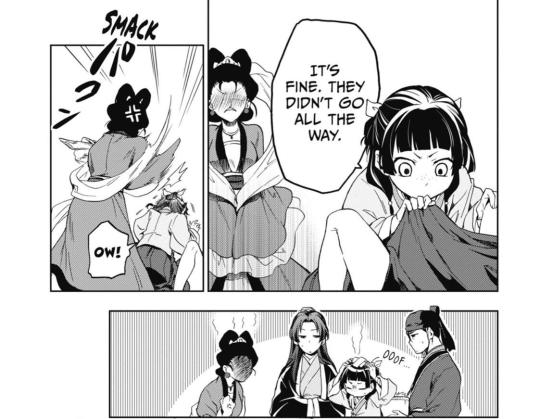
More lol @ Maomao. I said her upbringing in the pleasure district serves her well in the rear palace, but it (in addition to her apothecary background) also give her a unique and potentially off-putting outlook. This whole scenario can go to show how in spite of her regard for propriety, Maomao doesn't always behave how she "should."
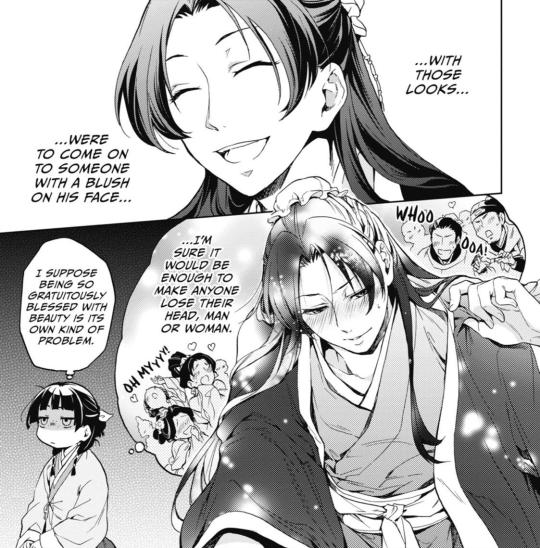
More of how Maomao frames Jinshi–"anyone would be attracted to him but to me, he is a worm." Does Maomao's familiarity with beauty make it somewhat ineffective on her? She makes the connection here about how Jinshi's beauty could be a burden (or not just harmful to others but to himself).
I also enjoy how a blushing Jinshi is described as being enough "to make anyone lose their head" when Maomao often says she does things/follows orders because she wants to keep her head attached to her body (aka not be executed).
Jinshi's attractiveness to both men and women is both a nod to varying sexualities and how he in a way transcends a binary understanding of gender presentation. I think it is interesting how Maomao is so blunt and matter-of-fact about people's attraction, to Jinshi and in general.
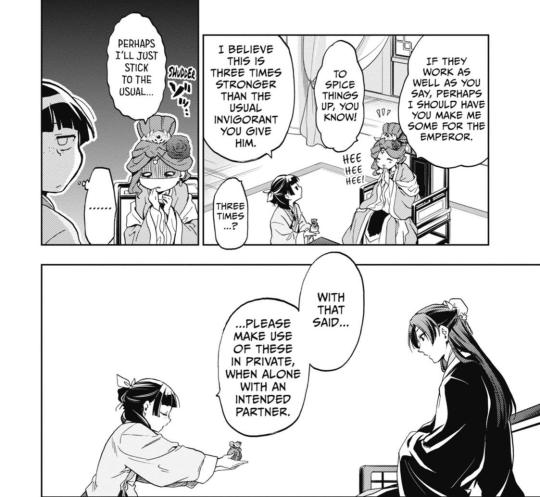
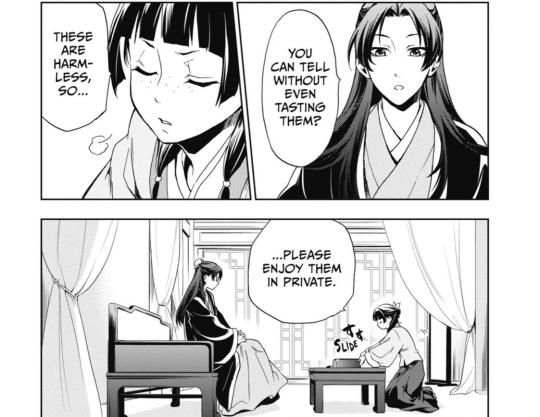
Similarly, I love this (repeated) matter-of-fact outlook on aphrodisiacs and pleasure from Maomao (it is almost non-judgmental but also emphasizes safety).
Alright, guess who used too many images and so has to continue this post elsewhere for the very end of the chapter...
#kusuriya no hitorigoto#the apothecary diaries#kusuriya no hitorigoto manga#the apothecary diaries manga#analysis#thoughts#maomao#jinshi#jinmao#jinshi x maomao#tad manga#manga#annotations#tad manga chapter 3#chapter 3
112 notes
·
View notes
Text
Sometimes authors forget that people are multi faceted and that they have lives outside of the main character, so it’s always a treat to see stories that treat all their characters with respect and nuance to their choices and circumstances.
always been struck by the intelligence that apothecary diaries treats its characters with. everyone in some way is shown to be so smart in a way that feels so human. maomao was taught formally by her father, lady gyokuyou and other concubines are perceptive and educated as they would be and would have to become to be in their position, and jinshi, while not as perceptive is just as perceptive as he needs to be to survive in the palace, similar to the concubines but in the nuance of his position and gender. it can't be understated how much it doesn't rely on shallow girl-bossery, the women are smart- gyokuyou and maomao just get each other and maomao's sisters are both talented and effortlessly navigate complicated political and personal relationships as we see later on, both their own and maomao's.
163 notes
·
View notes
Text
Kusuriya no Hitorigoto Part 2: OP2 Ambivalent

┏ · ──────── ·𖥸· ──────── · ┓
-> 2.1) Thornapple


The 1st flower showcased in the second opening is the Thornapple (Datura sp.), commonly known as the Moonflower and Devil's trumpet. Thornapple flowers are also shown in Episode 20 of the anime. Thornapple species are all exceedingly poisonous and psychoactive, particularly the seeds and flowers, which can cause respiratory depression, arrhythmias, fever, delirium, hallucinations, anticholinergic syndrome, psychosis, and death when ingested. In Japan, thornapple is called mandarake (曼荼羅華) and symbolises charm, false charm, dreaming and “intoxicating you” in hanakotoba. Its representation of charm is supposedly derived from the trumpet-like shape of its flowers—while its symbolism of false charm and intoxication stems from its severe toxicity. In Western floriography, thornapples symbolise power, caution, transformation and transition. Thornapples are also said to represent the cycle of life, death, and rebirth.
-> 2.2) Blue Roses


The 2nd set of flowers shown in the second opening are blue roses. These flowers are also featured in episodes 22, 23, and 24—with episode 22 highlighting Maomao's struggles to cultivate blue roses. Canonically blue roses are mostly commonly associated with Lakkan and Fengxian’s relationship. Blue roses do not occur naturally and are a product of human cultivation methods. For ages, botanists and scientists have been obsessed with obtaining blue roses. This unattainability has profoundly affected the symbolic meanings of blue roses worldwide. In Japan, blue roses are called aoi bara (青いバラ) or aoi soubi ( 青い薔薇). They represent dream fulfilment, miracles, impossibility and “blessings of God” in hanakotoba. In Western floriography, blue roses represent mystery, rarity, creativity and attaining the impossible. They are also associated with love at first sight, longing, captivating beauty and unattainable love. They are a powerful symbol of precious and unreachable love and are ideal for conveying deep and complex emotions.
-> 2.3) Rose Balsam


The 3rd flower depicted in the second opening is the rose balsam (Impatiens balsamina)—commonly known as garden balsam, spotted snapweed, and touch-me-not. Rose balsam is also featured in episodes 23 and 24, where it is primarily associated with Maomao's mother, Fengxian. In Japan, rose balsam is known as hōsenka (鳳仙花) and symbolises "don't touch me," short temper, and vivaciousness in hanakotoba. Its Japanese name is a phonetic interpretation of its Chinese name and is derived from the flower's shape—which is thought to resemble the mythological phoenix. The balsam's symbolism of impatience, short temper, and "don't touch me" stems from its fruit, which when mature bursts at the slightest contact and scatters its seeds. In Asia, rose balsam petals are crushed and combined with alum to create a dye used to colour fingernails. In Western floriography, rose balsam mainly represents impatience and ardent or fiery love. The rose balsam also embodies purity, innocence, and beauty. The flower also represents motherly love, which, while appearing counterintuitive, can be interpreted as a metaphor for the complexities of maternal care. The figurative symbolism of rose balsam combines sensitivity with strength similarly to a mother who relentlessly protects her children while encouraging their freedom. The balsam's representation of "fiery love" stems from the vivid red colour of its flowers, which evokes an image of passionate love.
┗ · ──────── ·𖥸· ──────── · ┛
Part 1A│ Part 1B │Part 2
╰➤ Other anime & donghua hanakotoba posts

[A/N: Please check out part 1A and 1B as well! Since I've only watched the anime but haven't read the manga or light novels and thus cannot comment on how everything ties into the overarching storyline or character development—I didn't go into too much detail here... Also, since there are so many flowers featured, this post would grow way too long if I did lmao.
If anyone has any ideas on what anime/anime theme song I should cover next in this series please lmk✿ Also, if you liked this post, check out my other hanakotoba analysis posts...]
#kusuriya no hitorigoto#apothecary diaries#the apothecary diaries#jinshi x maomao#maomao#jinshi apothecary diaries#maomao apothecary diaries#hana ni natte#hanakotoba#hanakotoba analysis#flower symbolism#anime flower symbolism#anime hanakotoba#anime opening symbolism#anime symbolism#anime#manga#anime analysis#floriography#jinmao#apothecary diaries anime#apothecary's soliloquy#薬屋のひとりごと#maomao x jinshi#ambivalent
34 notes
·
View notes
Text
i cannot recommend enough that you take a break from the popular shounen anime grind and watch something that's a bit weird and obscure and has a female lead. i'm in love with the villainess, a take on the problematic lesbian trope that's gained popularity in yuri circles. talentless nana, a thriller with themes of guilt and the cultural analysis of what happens when people have or don't have superpowers. the apothecary diaries, a historical chinese drama with an autistic seventeen year old girl trying to navigate the social classes while avoiding attention and helping out her fellow commoner women.
14 notes
·
View notes
Text
The Apothecary Diares Season 2 Episodes 1 & 2 watch
Season 1 of Apothecary Diaries was one of my favourite shows in a while, and thats a huge bar considering frieren and dungeon meshi were airing alongside it. and while im not good at the typical fandom gushing or art-making for it, i Can give it the good ol' mystery analysis that it deserves. people who remember my umineko liveblog days, i promise im better at this now
this won't be a super-detailed recap, it'll be more me just noting down a detail that i picked up on then extrapolating what it could mean, and no doubt coming up with some very wrong theory. also gonna be making these notes with knowledge of the rest of the episode, or both episodes in this case. and with that being said

well I guess I gotta start off with an additional rule for myself: while the opening is really good, I won't be using anything that it's clearly foreshadowing as basis to theorise on, it's just flat out cheating. though we're already seeing details in it already showing up by episode 2


so. consort Loulan. bit of a tricky one to wrap my head around at the moment. we know next to nothing about this character outside of her body language, but we do see a lot what she's done. or rather, what her father has done. requesting a lot of maids, decorating her building in a lot of high quality goods. from the outside my first impression is that it that Loulan is just a figurehead for her father's own machinations. and adding a shit tonne of servants to the Crystal Pavilion that (i assume) were hand-picked just reeks of conspiracy, especially with one of the emperor's own children there. Though I have a different theory about Loulan that I'll come back to later, so put a pin in this

so, until a line later where one of the maids directly says that Gaoshun was the one to directly give them the books, I was sceptical if Jinshi really was the one who put the request in for these books. there could still be some convuluted way that someone else did in fact put the request in, but for now that doesn't seem likely. this just seemed like one of those details that would come around to bite Maomao in the butt for making a wrong assumption. the only other detail i noted here was that Gaoshun remarked that the books were well made, so maybe this is some ploy to smuggle something into the Crystal Pavilion that the book or cover or string is made out of, idk

and then there's this scene. like the opening, im hesitant to include it in my reasoning and theory crafting, since this is information Maomao isn't privy to. that break's one of knox's rules i'm sure.. but now I guess I'll make note that Shisui is sneaking out at night, and the framing seems to imply whatever she's doing is related to where Maomao the second came from. and there's a scene in the next episode i'm gonna talk about at length

love love love that this anime is constantly hammering in the political implications of everything, even a young child just going for a walk. this isn't really a mystery detail or anything, i just wanna gush a bit.

So! our beloved Maomao the second. seems likely that someone smuggled her in, and given that other scene that we the audience see that Maomao doesn't, I have a decent idea why. but i'll get to that when we get to that scene

just noting down here that the caravan is indeed connected to our Two Mystery White Women, and very likely under their control. just something to point out considering that the caravan did indeed bring some anti-pregnancy spices and perfumes.


oops, another scene that Maomao doesn't see. seems very likely that Lihua is also pregnant, and her head maid is being painted in a sinister light. i don't remember if this is the same maid that Maomao slapped for giving Lihua the poisonous makeup, but regardless I think it's a red herring to be suspicious of her. but put another pin in this, since pregnancy is gonna be a topic brought up later

as unsanitary as it is, the show is setting up here that there's technically a way into the rear palace through the sewer. though i doubt that they're like american cartoon sewer that could house a whole living space in, but i dont know why else the show would bring it up, especially since it brings up the idea of smuggling things into the rear palace later on


and again, setting up another idea, that of disease being spread and how the rear palace deals with it. aaaand because of a later Scene With Maomao In It we know that this is gonna be one of the mysteries of focus


i have nothing to observe that Maomao hasn't pieced together yet, but i do appreciate the narrative parralel with Maomao trying to save Gyokuyou and Lihue's babies, and now she's gonna be working to save their new pregnancies

so hey! Shisui! she's almost definitely working for Loulan's group in some capacity, likely gathering intel from the other lower level servants. that seems like a pretty reasonable jump to make. however, i have an even wackier theory to put forward, with like maybe two and half pieces of evidence to back me up


i think that Shisui is Loulan. either the Loulan we keep seeing in her own quarters is a body double while the 'real' consort hides among her own staff, or Loulan is sneaking out/allowed to disguise as Shisui. i personally think the former situation is more likely, since Loulan's dad has been making moves in the pavilion. but the second case suddenly gives her a lot of personality as a 'princess who constantly runs away' and would also motivate her to do a lot of different things
here's the very iffy list of evidence I have to support this theory: 1) as mentioned above, Shisui is pretty likely to have some sort of connection to Loulan and her maids. 2) Shisui's name is very similar to Loulan's father's name Shishou. I don't want to look up the kanji of their names in case i get spoiled hard from some wiki, but I'd bet a good penny that both names are written with similar kanji. 3) this is pretty iffy, but both times that Shisui met Maomao she didn't do a proper introduction or ask her her name. And why would she? She already met Maomao as Loulan back in season 1. It could be that Shisui is just an incredibly casual person and didn't feel the need to do a proper introduction or anything, but idk it still feels iffy. 4) Shisui and Loulan have a similar hair and eye colour. Yes, I know i shouldn't use this since the light novel probably didnt have these details, I'm going with this as proof anyway, it worked with Jinshi and his mom after all.
anyway, back to the episode

OKAY, JUST one more rant/hunch about the Shisui=Loulan theory. I don't have a map of the rear palace (again, too scared to look it up for spoiler reasons) but I bet if there was one in the light novel that Loulan's residence would be in the northern area. regardless of ideas I don't have proof of, it's still suspicious that Shisui knows this and Xiaolan doesn't. she explained it with her wanting to go there and draw insects, but. I dunno. still feels fishy.
regardless of my pet theory, Shisui dropping this idea does feel like she's intentionally hinting at it for Maomao to follow up on later. she could be more of a manipulator than I thought.

back to more patent-pending Maomao-less Scenes, we have a very sick person being attended to by someone with a lot of what is likey perfumes and ointments. i'd need Maomao's expert opinion if these are being used as a treatment for the sick person through aromatherapy of some kind, or if this is some sort of torture for them... or if the person treating them even knows what they're doing.

Maomao says it as a retort, but there's value to this idea that all these anti-baby herbs and medicines being snuck into the palace being intended as medicine instead of an attack on the consorts
by the way, remember Maomao the second? if the sick person is being treated here, then perhaps this is where our little cat came from. whoever is treating this sick person is could have a cat or maybe multiple cats around to keep diseased rats away. One of them either escaped or gave birth unexpectantly and one of the children escaped, and boom we have Maomao the second. this is kind of a weak idea, but it's what I got for now. as Maomao the first laments later in the episode, we likely don't have enough clues to solve this right now.
one last thing to speculate is why this supposed sick person is staying in the rear palace instead of just being sent home to recover. one idea is that the medicine they need for their treatment can only be found here in the palace, or would be cheaper to take from the palace. though that would imply that they were already hiding before they got sick, and it was just convenient

but another idea is that they're someone who cannot risk leaving- either a high ranking consort or official, OR. someone who doesn't want to be found. like Suirei.


and so the episode ends on the fear of a strong poison being in the tea. possibly the entire rear palace's tea leaves. though this is framed as a cliffhanger, so I imagine we'll be getting more details about it next episode that I can get a solid read on.
so that's the first two episodes down. my main grasp on the situation is that we have two currently relevant conspiracies going on: The Impending White Women, and our mysterious sick person. despite my ideas about our sick person getting treatment from the ointments and perfumes, I still the the caravan and foreign emissaries are most suspicious, especially if we're going with a poisoned tea plot for a while instead of the anti-pregnancy substances. as for whoever is taking care of the sick person, it's hard to pin them as particularly malicious, unless it actually is Suirei. i'd think it'd be a bit more interesting if it wasn't Suirei actually, because it would set up a moral dilemma for Maomao once she discovers it: put the health of this sick person at risk by exposing them, or put Gyokuyou and Lihue's pregnancies at risk by keeping them safe? speculation aside, I'm out of ideas for now. there's probably more details i shouldve picked up on, probably something in the Maomao and Jinshi tea scene, but I'm tapped for now. Now we just wait for episode three. If you have any ideas yourself, feel free to discuss!
#the apothecary diaries spoilers#the apothecary diaries#kusuriya no hitorigoto spoilers#kusuriya no hitorigoto#maomao#jinshi#shisui#loulan
13 notes
·
View notes